2016新目标英语九年级全册课文和单词录音(MP3)
人教版 新目标 九年级英语全册全课文翻译

新人教版九年级英语全册全课文翻译重视英语翻译教学有助于学生提高语言综合水平。
Unit1 How can we become good learners?Section A 2d----安妮,我有点紧张,我必须读完一本书,以便下周一作报告。
----听起来不太糟糕。
----但我是一个读书很慢的人。
----一开始只管快速阅读获取文章大意就好了,不要逐字逐句的读,按词组阅读。
----但我很多单词都不懂,我不得不用字典。
----尽量通过阅读上下文来猜测单词的意思,可能你知道的比你预想的要多。
----那听起来很难!----哦,耐心点,这得花时间。
你可以每天通过阅读你喜欢的东西得到提高。
你读得越多,你(阅读的速度)就越快。
Section A 3a我是如何学会学习英语的去年,我不喜欢我的英语课。
每节课像是一个噩梦。
老师说的太快以至于我大多数时候都听不太懂。
因为我糟糕的发音,我害怕问问题。
我只是躲在我的课本后面,从来不说一句话。
后来有一天我看了一部叫做《玩具总动员》的英语电影。
我爱上了这部既激动人心又滑稽有趣的电影!就这样我也开始看其他的英文电影。
虽然我无法听懂那些角色所说的全部内容,但他们的肢体语言和面部表情帮助我理解了意思。
我也意识到我可以通过只听关键词来理解意思。
通过听英文电影中的对话,我的发音也变的更好了。
我发现听一些有趣的内容是学习语言的秘诀。
我还学到了一些有用的句子比如“这简直是小菜一碟”或者“你活该”。
我起初不理解这些句子,但是因为我想理解这个故事,所以我查了字典。
现在我真的喜欢我的英语课。
我想学习生词和更多的语法,那样我对英语电影就能有更好的理解了。
Section B 2b怎么成为一个成功的学习者呢?每个人天生就拥有学习的能力。
但是你能否学习的好取决于你的学习习惯。
研究显示成功的学习者有一些共同的好习惯。
1.培养他们对所学东西的兴趣研究显示,如果你对某事物感兴趣,你的大脑会更活跃而且对你来说长时间地关注那个事物也容易些。
2024新版(人教版)九年级英语单词带音标

2024新版(人教版)九年级英语单词带音标1序号 英文 中文序号 英文 中文1textbook/ˈtekstbʊk/n.教科书;课本25speed/spiːd/n.速度2conversation/ˌkɒnvəˈseɪʃ(ə)n/n.交谈;谈话26review/ rɪˈvjuː /v.&n.回顾;复习3aloud/əˈlaʊd/adv.大声地;出声地27partner/ˈpɑːtnə(r)/n.搭档;同伴4pronunciation/prəˌnʌnsiˈeɪʃ(ə)n/n.发音;读音28born/bɔːn/v.出生5sentence/ˈsentəns/n.句子29born/bɔːn/adj.天生的6patient/ˈpeɪʃ(ə)nt/adj.有耐心的30be born with天生具有7patient/ˈpeɪʃ(ə)nt/n.病人31ability/əˈbɪləti/n.能力;才能8secret/ˈsiːkrət/n.秘密;秘诀32create/kriˈeɪt/v.创造;创建9secret/ˈsiːkrət/adj.秘密的;保密的33brain/breɪn/n.大脑10expression/ɪkˈspreʃ(ə)n/n.表情;表示;表达方式34active/ˈæktɪv/adj.活跃的;积极的11discover/dɪˈskʌvə(r)/v.发现;发觉35attention/əˈtenʃ(ə)n/n.注意;关注12look up (在词典、参考书中或通过电脑)查阅;抬头看36pay attention to注意;关注13grammar/ˈɡræmə(r)/n.语法37connect/kəˈnekt/v.(使)连接;与……有联系14repeat/rɪˈpiːt/v.重复;重做38connect...with把……和……连接或联系起来15note/nəʊt/n.笔记;记录39overnight/ˌəʊvəˈnaɪt/adv.一夜之间;在夜间16note/nəʊt/v.注意;指出40knowledge/ˈnɒlɪdʒ/n.知识;学问17pal/pæl/n.朋友;伙伴41lifelong/ˈlaɪflɒŋ/adj.终身的;毕生的18physics/ˈfɪzɪks/n.物理;物理学42wisely/ˈwaɪzli/adv.明智地;聪明地19chemistry/ˈkemɪstri/n.化学43Annie/ˈæni/安妮(女名)20memorize/ˈmeməraɪz/v.记忆;记住44Alexander Graham Bell亚历山大·格雷厄姆·贝尔21pattern/ˈpæt(ə)n/n.模式;方式45mooncake/ˈmu:nkeɪk/n.月饼22novel/ˈnɒv(ə)l/n.(长篇)小说46lantern/ˈlæntən/n.灯笼23pronounce/prəˈnaʊns/v.发音47stranger/ˈstreɪndʒə(r)/n.陌生人24increase/ɪnˈkriːs/v.增加;增长48relative/ˈrelətɪv/n.亲属;亲戚49put on增加(体重);发胖74gather/ˈɡæðə(r)/v.聚集;集合50pound/paʊnd/n.磅(重量单位);英镑(英国货币单位)75count down倒计时51folk/fəʊk/adj.民间的;民俗的76custom/ˈkʌstəm/n.风俗;习俗52goddess/ˈɡɒdes;ˈɡɒdəs/n.女神77involve/ɪnˈvɒlv/v.包含;牵涉53whoever/huːˈevə(r)/pron.无论谁;不管什么人78crowd/kraʊd/n.人群;观众54steal/stiːl/v.偷;窃取79bottom/ˈbɒtəm/n.底部;最下部55lay/leɪ/v.放置;安放;产(卵);下(蛋)80dust/dʌst/n.沙土;尘土56lay out摆开;布置81dust/dʌst/v.擦灰;掸去57dessert/dɪˈzɜːt/n.(饭后)甜点;甜食82couplet/ˈkʌplət/n.对联;对句58garden/ˈɡɑːd(ə)n/n.花园;园子83set off(sth.)点燃;使……爆炸59tradition/trəˈdɪʃ(ə)n/n.传统84eve/iːv/n.前夕;前夜60admire/ədˈmaɪə(r)/v.欣赏;仰慕85express/ɪkˈspres/v.表达;表示61treat/triːt/n.款待;招待86reunion/ˌriːˈjuːniən/n.团圆;团聚62treat/triːt/v.招待;请(客)87smell/smel/v.闻到;发出…气味63tie/taɪ/n.领带88smell/smel/n.气味;臭味64tie/taɪ/v.捆;束89breeze/briːz/n.微风;和风65dinosaur/ˈdaɪnəsɔː(r)/n.恐龙90picnic/ˈpɪknɪk/n.&v.野餐66mushroom/ˈmʌʃrʊm/n.蘑菇91coming/ˈkʌmɪŋ/adj.即将发生的;下一个的67togetherness/təˈɡeðənəs/n.和睦相处;亲密无间92coming/ˈkʌmɪŋ/n.到来68happiness/ˈhæpinəs/n.快乐;高兴93Macao/məˈkaʊ/澳门69lunar/ˈluːnə(r)/adj.月球的;月亮的94Chiang Mai清迈(泰国城市)70riddle/ˈrɪd(ə)l/n.谜;谜语95Egypt/ˈiːdʒɪpt/埃及71celebration/ˌselɪˈbreɪʃn/n.庆典;庆祝活动96Scottish/ˈskɒtɪʃ/adj.苏格兰的;苏格兰人的72firework/ˈfaɪəwɜːk/n.烟火;烟花;(pl.)烟花表演97Water Festival泼水节73take place发生98Mid-Autumn Festival中秋节99Mother's Day母亲节124nearby/ˌnɪəˈbaɪ/adj.附近的;邻近的100Father's Day父亲节125nearby/ˌnɪəˈbaɪ/adv.在附近;附近101Spring Festival春节126pardon me抱歉,对不起;什么,请再说一遍102Big Ben大本钟127mail/meɪl/v.邮寄;发电子邮件103Auld Lang Syne《友谊地久天长》128mail/meɪl/n.邮件;信件104Time Square时代广场129east/iːst/adv.向东;朝东105Sham El-Nessim(埃及)闻风节130east/iːst/adj.东方的;东部的106Clara/ˈklara/克拉拉(女名)131east/iːst/n.东;东方107restroom/ˈrestruːm;ˈrestrʊm/n.(美)洗手间;公共厕所132fascinating/ˈfæsɪneɪtɪŋ/adj.迷人的;极有吸引力的108stamp/stæmp/n.邮票;印章133inexpensive/ˌɪnɪkˈspensɪv/adj.不昂贵的109bookstore/ˈbʊkstɔː(r)/n.书店134uncrowded/ʌnˈkraʊdɪd/adj.不拥挤的;人少的110beside/bɪˈsaɪd/prep.在……旁边;在……附近135convenient/kənˈviːniənt/adj.便利的;方便的111postcard/ˈpəʊstkɑːd/n.明信片136mall/mɔːl;mæl/n.商场;购物中心112pardon/ˈpɑːd(ə)n/v.原谅137clerk/klɑːk/n.职员113pardon/ˈpɑːd(ə)n/interj.请再说一遍138corner/ˈkɔːnə(r)/n.拐角;角落114washroom/ˈwɒʃruːm/n.洗手间;厕所139politely/pəˈlaɪtli/adv.礼貌地;客气地115bathroom/ˈbɑːθruːm;ˈbɑːθrʊm/n.浴室;洗手间140request/rɪˈkwest/n.&v.要求;请求116normally/ˈnɔːməli/adv.通常;正常情况下141direction/dəˈrekʃ(ə)n/n.方向;方位117rush/rʌʃ/v.&n.仓促;急促142correct/kəˈrekt/adj.正确的;恰当的118suggest/səˈdʒest/v.建议;提议143polite/pəˈlaɪt/adj.有礼貌的;客气的119pass by路过;经过144direct/dəˈrekt/adj.直接的;直率的120staff/stɑːf/n.管理人员;职工145speaker/ˈspiːkə(r)/n.讲(某种语言)的人;发言者121grape/ɡreɪp/n.葡萄146whom/huːm/pron.谁;什么人122policeman/pəˈliːsmən/n.男警察147impolite/ˌɪmpəˈlaɪt/adj.不礼貌的;粗鲁的123central/ˈsentrəl/adj.中心的;中央的148address/əˈdres/n.住址;地址;通讯处149underground/ˌʌndəˈɡraʊnd/adj.地下的174require/rɪˈkwaɪə(r)/v.需要;要求150underground/ˌʌndəˈɡraʊnd/n.地铁175European/ˌjʊərəˈpiːən/n.欧洲(人)的151parking lot停车场;停车区176European/ˌjʊərəˈpiːən/n.欧洲人152course/kɔːs/n.课程;学科177African/ˈæfrɪkən/n.非洲(人)的153Italian/ɪˈtæliən/adj.意大利(人)的178African/ˈæfrɪkən/n.非洲人154Italian/ɪˈtæliən/n.意大利人;意大利语179British/ˈbrɪtɪʃ/adj.英国(人)的155Tim/tɪm/蒂姆(男名)180insect/ˈɪnsekt/n.昆虫156humorous/ˈhjuːmərəs/adj.有幽默感的;滑稽有趣的181ant/ænt/n.蚂蚁157silent/ˈsaɪlənt/adj.不说话的;沉默的182speech/spiːtʃ/n.讲话;发言158helpful/ˈhelpf(ə)l/adj.有用的;有帮助的183public/ˈpʌblɪk/adj.民众159from time to time时常;有时184public/ˈpʌblɪk/adj.公开的;公众的160score/skɔː(r)/n.&v.得分;进球185in public公开地;在别人(尤指生人)面前161background/ˈbækɡraʊnd/n.背景186spider/ˈspaɪdə(r)/n.蜘蛛162interview/ˈɪntəvjuː/n.采访;面试187seldom/ˈseldəm/adv.不常;很少163interview/ˈɪntəvjuː/n.面试;访谈188influence/ˈɪnfluəns/v.&n.影响164Asian/ˈeɪʒ(ə)n/n.亚洲(人)的189absent/ˈæbsənt/adj.缺席;不在165Asian/ˈeɪʒ(ə)n/n.亚洲人190fail/feɪl/v.不及格;失败;未能(做到)166deal/diːl/v.对付;对待191examination/ɪɡˌzæmɪˈneɪʃ(ə)n/n.考试;审查167deal with应对;处理192boarding school寄宿学校168shyness/ˈʃaɪnəs/n.害羞;腼腆193in person亲身;亲自169dare/deə(r)/v.敢于;胆敢194exactly/ɪɡˈzæktli/adv.确切地;精确地170ton/tʌn/n.吨;大量;许多195pride/praɪd/n.自豪;骄傲171private/ˈpraɪvət/adj.私人的;私密的196take pride in为……感到自豪172guard/ɡɑːd/v.警卫;看守197proud/praʊd/adj.自豪的;骄傲的173guard/ɡɑːd/v.守卫;保卫198be proud of为……骄傲;感到自豪199general/ˈdʒen(ə)rəl/n.总的;普遍的;常规的224process/ˈprəʊses/v.加工;处理200general/ˈdʒen(ə)rəl/n.将军225process/ˈprəʊses/n.过程201introduction/ˌɪntrəˈdʌkʃn/n.介绍226pack/pæk/v.包装;装箱202Paula/ˈpɔːlə/葆拉(女名)227business/ˈbɪznəs/n.生意;商业203Alfred/ˈælfrɪd/艾尔弗雷德(男名)228product/ˈprɒdʌkt/n.产品;制品204Billy/ˈbɪli/比利(男名)229France/frɑːns/法国205Candy/ˈkændi/坎迪(女名)230no matter不论;无论206Jerry/ˈdʒeri/杰里(男名);杰丽(女名)231local/ˈləʊk(ə)l/adj.当地的;本地的207Emily/ˈeməli/埃米莉(女名)232brand/brænd/n.品牌;牌子208chopstick/ˈtʃɒpstɪk/n.筷子233avoid/əˈvɔɪd/v.避免;回避209coin/kɔɪn/n.硬币234handbag/ˈhændbæɡ/n.小手提包210fork/fɔːk/n.餐叉,叉子235mobile/ˈməʊbaɪl/adj.可移动的;非固定的211blouse/blaʊz/n.(女士)短上衣;衬衫236everyday/ˈevrideɪ/adj.每天的;日常的212silver/ˈsɪlvə(r)/n.银;银器237boss/bɒs/n.老板;上司213sliver/ˈslɪvə(r)/adj.银色的238Germany/ˈdʒɜːməni/德国214glass/ɡlɑːs/n.玻璃239surface/ˈsɜːfɪs/n.表面;表层215cotton/ˈkɒtn/n.棉;棉花240material/məˈtɪəriəl/n.材料;原料216steel/stiːl/n.钢;钢铁241punish/ˈpʌnɪʃ/v.处罚;惩罚217fair/feə(r)/n.展览会;交易会242traffic/ˈtræfɪk/n.交通;路上行驶的车辆218environmental/ɪnˌvaɪrənˈment(ə)l/adj.自然环境的;有关环境的243postman/ˈpəʊstmən/n.邮递员219grass/ɡrɑːs/n.草;草地244cap/kæp/n.(尤指有帽舌的)帽子220leaf/liːf/n叶;叶子245glove/ɡlʌv/n.(分手指的)手套221produce/prəˈdjuːs/v.生产;制造;出产246international/ˌɪntəˈnæʃ(ə)nəl/adj.国际的222widely/ˈwaɪdli/adv.广泛地;普遍地247competitor/kəmˈpetɪtə(r)/n.参赛者;竞争者223be known for以……闻名;为人知晓248its/ɪts/pron.它的249form/fɔːm/n.形式;类型258heat/hiːt/v.加热;变热250clay/kleɪ/n.黏土;陶土259polish/ˈpɒlɪʃ/v.磨光;修改;润色251balloon/bəˈluːn/n.气球260complete/kəmˈpliːt/v.完成252paper cutting剪纸261South Korea韩国253scissors/ˈsɪzəz/n.剪刀262Switzerland/ˈswɪtsələnd/瑞士254lively/ˈlaɪvli/adj.生气勃勃的;(色彩)鲜艳的263San Francisco圣弗朗西斯科(旧金山,美国城市)255fairy/ˈfeəri/童话故事264Marcus/ˈmɑ:kəs/马库斯(男名)256historical/hɪˈstɒrɪk(ə)l/adj(有关)历史的265Pam/pæm/帕姆(女名)257heat/hiːt/n.热;高温2024新版(人教版)九年级英语单词带音标2序号 英文 中文序号 英文 中文1heel/hiːl/n.鞋跟;足跟25trade/treɪd/v.做买卖;从事贸易2scoop/skuːp/n.勺;铲子26popularity/ˌpɒpjuˈlærəti/n.受欢迎;普及3electricity/ɪˌlekˈtrɪsəti/n.电;电能27doubt/daʊt/n.疑惑;疑问4style/staɪl/n.样式;款式28doubt/daʊt/v.怀疑5project/ˈprɒdʒekt;prəˈdʒekt/n.项目;工程29without doubt毫无疑问;的确6pleasure/ˈpleʒə(r)/n.高兴;愉快30fridge/frɪdʒ/n.冰箱7zipper(=zip)n.拉链;拉锁31low/ləʊ/adj.低的;矮的8daily/ˈdeɪli/adj.每日的;日常的32somebody/ˈsʌmbədi/pron.某人9have a point有道理33somebody/ˈsʌmbədi/n.重要人物10website/ˈwebsaɪt/n.网站34wolf/ wʊlf /n.狼11pioneer/ˌpaɪəˈnɪə(r)/n.先锋;先驱35warn/ wɔːn /v.警告,告诫12list/lɪst/v.列表;列清单36translate/trænzˈleɪt/v.翻译13list/lɪst/n.名单;清单37lock/lɒk/v.锁上;锁住14mention/ˈmenʃ(ə)n/v.提到;说到38lock/lɒk/n.锁15spread/spred/v.传播;展开39ring/rɪŋ/v.(使) 发出钟声或铃声;打电话16spread/spred/n.蔓延;传播40earthquake/ˈɜːθkweɪk/n.地震17by accident偶然;意外地41sudden/ˈsʌd(ə)n/adj.突然(的)18accidental/ˌæksɪˈdent(ə)l/adj.意外的;偶然的42all of a sudden突然;猛地19ruler/ˈruːlə(r)/n.统治者;支配者43bell/bel/n.钟(声);铃(声)20boil/bɔɪl/v.煮沸;烧开44biscuit/ˈbɪskɪt/n.饼干21remain/rɪˈmeɪn/v.保持不变;剩余45cookie/ˈkʊki/n.曲奇饼22sage/seɪdʒ/n.圣人;智者46musical/ˈmjuːzɪk(ə)l/adj.音乐的;有音乐天赋的23national/ˈnæʃ(ə)nəl/adj.国家的;民族的47instrument/ˈɪnstrəmənt/n.器械;仪器;工具24trade/treɪd/n.贸易;交易48crispy/ˈkrɪspi/adj.脆的;酥脆的49salty/ˈsɔːlti/adj.咸的74safety/ˈseɪfti/n.安全;安全性50sour/ˈsaʊə(r)/adj.酸的;有酸味的75smoke/sməʊk/v.冒烟;吸烟51by mistake错误地;无意中76smoke/sməʊk/n.烟52customer/ˈkʌstəmə(r)/n.顾客;客户77part-time adj.&adv.兼职(的)53the Olympics奥林匹克运动会78pierce/pɪəs/v.扎;刺破;穿透54Canadian/kəˈneɪdiən/adj.加拿大的;加拿大人的79earring/ˈɪərɪŋ/n.耳环;耳饰55Canadian/kəˈneɪdiən/n.加拿大人80flash/flæʃ/n.闪光灯;闪光56divide/dɪˈvaɪd/v.分开;分散81flash/flæʃ/v.闪耀;闪光57divide...into把……分开82tiny/ˈtaɪni/adj.极小的;微小的58basket/ˈbɑːskɪt/n.篮;筐83cry/kraɪ/v.&n.哭;叫喊59not only...but also...不但……而且……84field/fiːld/n.田野;场地60look up to钦佩;仰慕85hug/hʌɡ/n.&v.拥抱;搂抱61hero/ˈhɪərəʊ/n.英雄;男主角86lift/lɪft/v.举起;抬高62professional/prəˈfeʃən(ə)l/adj.职业的;专业的87lift/lɪft/n.电梯;搭便车63nearly/ˈnɪəli/adv.几乎88badly/ˈbædli/adv.严重地;差;非常64Berlin/bɜːˈlɪn/柏林(德国城市)89talk back回嘴;顶嘴65NBA(National Basketball Association) 国家篮球协会(美国职业篮球联赛)90awful/ˈɔːf(ə)l/adj.很坏的;讨厌的66CBA(China Basketball Association) 中国篮球协会(中国职业篮球联赛)91teen/tiːn/n.(13至19岁之间)青少年67Roy罗伊(男名)92regret/rɪˈɡret/v.&n.感到遗憾;懊悔68Whitcomb Judson惠特科姆·贾德森93poem/ˈpəʊɪm/n.诗;韵文69Ruby/ˈruːbi/鲁比(女名)94community/kəˈmjuːnəti/n.社区;社团70Thomas Watson托马斯·沃森95keep...away from避免接近;远离71George Crum乔治·克拉姆96chance/tʃɑːns/n.机会;可能性72James Naismith詹姆斯·奈史密斯97make one's own decision 自己做决定73license(=licence)n.证;证件98educate/ˈedʒukeɪt/v.教育;教导99manage/ˈmænɪdʒ/v.完成(困难的事);应付(困难局面)124universe/ˈjuːnɪvɜːs/n.宇宙100society/səˈsaɪəti/n.社会125parallel universes平行宇宙101get in the way of挡……的路;妨碍126mix-up n.混乱;杂乱102support/səˈpɔːt/v.&n.支持127generally speaking一般来说103end up最终成为;最后处于128trick/trɪk/n.引起错觉(或记忆紊乱)的事物;诡计104enter/ˈentə(r)/v.进来;进去129trick/trɪk/v.欺骗;欺诈105choice/tʃɔɪs/n.选择;挑选130unsolved/ˌʌnˈsɒlvd/adj.未解决的;未破解的106Picasso毕加索(西班牙画家)131laboratory/ləˈbɒrətri/n.实验室107whose/huːz/adj.&pron.谁的132outdoors/ˌaʊtˈdɔːz/adv.在户外;在野外108truck/trʌk/n.卡车;货车133coat/kəʊt/n.外套;外衣109rabbit/ˈræbɪt/n.兔;野兔134lie/laɪ/v.平躺;处于110attend/əˈtend/v.出席;参加135sleepy/ˈsliːpi/adj.困倦的;瞌睡的111valuable/ˈvæljuəb(ə)l/adj.贵重的;很有用的;宝贵的136land/lænd/v.着陆;降落112pink/pɪŋk/adj.粉红色的137alien/ˈeɪliən/n.外星人113pink/pɪŋk/n.粉红色138run after追逐;追赶114anybody/ˈenibɒdi/pron.任何人139suit/suːt/n.西服;套装115déjà vu n.似曾经历过的感觉;似曾相识140suit/suːt/v.适合116mystery/ˈmɪst(ə)ri/n.奥秘;神秘事物141at the same time同时;一起117be known as被称为;被认为是142circle/ˈsɜːk(ə)l/n.圆圈118theory/ˈθɪəri/n.学说;理论;看法143circle/ˈsɜːk(ə)l/v.圈出119familiar/fəˈmɪliə(r)/adj.熟悉的;常见到的144Britain(=Great Britain)n.大不列颠120hidden/ˈhɪd(ə)n/adj.秘密的;隐藏的145receive/rɪˈsiːv/v.接待;接受;收到121power/ˈpaʊə(r)/n.能力;权力146historian/hɪˈstɔːriən/n.历史学家;史学工作者122link/lɪŋk/n.联系;连接147temple/ˈtemp(ə)l/n.庙宇;寺院;圣殿123parallel/ˈpærəlel/adj.平行(的);同时发生的148leader/ˈliːdə(r)/n.领导;领袖149midsummer/ˌmɪdˈsʌmə(r)/n.仲夏;中夏174smooth/smuːð/adj.悦耳的;平滑的150medical/ˈmedɪk(ə)l/adj.医疗的;医学的175spare/speə(r)/adj.空闲的;不用的151purpose/ˈpɜːpəs/n.目的;目标176spare/speə(r)/v.抽出;留出152prevent/prɪˈvent/v.阻止;阻挠177director/dəˈrektə(r);daɪˈrektə(r)/n.导演;部门负责人153energy/ˈenədʒi/n.力量;精力178case/keɪs/n.情况;实情154position/pəˈzɪʃ(ə)n/n.位置;地方179in that case既然那样;假使那样的话155burial/ˈberiəl/n.埋葬;安葬180war/wɔː(r)/n.战争;战争状态156honor(=honour)v.尊重;表示敬意181stick/stɪk/v.粘贴;将……刺入157honor(=honour)n.荣幸;荣誉182stick to坚持;固守158ancestor/ˈænsestə(r)/n.祖宗;祖先183down/daʊn/adj.悲哀;沮丧159victory/ˈvɪktəri/n.胜利;成功184dialog(=dialogue)n.对话;对白160enemy/ˈenəmi/n.敌人;仇人185ending/ˈendɪŋ/n.(故事、电影等的)结尾;结局161period/ˈpɪəriəd/n.一段时间;时期186documentary/ˌdɒkjuˈment(ə)ri/n.纪录片162noise/ nɔɪz /n.声音,噪音187drama/ˈdrɑːmə/n.戏;剧163Stonehenge/ˌstəʊnˈhendʒ/巨石阵188plenty/ˈplenti/pron.大量;众多164Carla/ˈkɑːlə/卡拉(女名)189plenty of大量;充足165J.K.Rowling J.K.罗琳(英国作家)190shut/ʃʌt/v.关闭;关上166Jean/dʒiːn/琼(女名)191shut off关闭;停止运转167Paul Stoker保罗·斯托克192superhero/ˈsuːpəhɪərəʊ/n.超级英雄168prefer/prɪˈfɜː(r)/v.更喜欢193once in a while偶尔地;间或169lyrics/ˈlɪrɪks/n.(pl.)歌词194intelligent/ɪnˈtelɪdʒənt/adj.有才智的;聪明的170Australian/ɒˈstreɪliən/adj.澳大利亚(人)的195sense/sens/v.感觉到;意识到171Australian/ɒˈstreɪliən/n.澳大利亚人196sense/sens/n.感觉;意识172electronic/ɪˌlekˈtrɒnɪk/adj.电子的;电子设备的197sadness/ˈsædnəs/n.悲伤;悲痛173suppose/səˈpəʊz/v.推断;料想198pain/peɪn/n.痛苦;疼痛;苦恼199reflect/rɪˈflekt/v.反映;映出224bow/baʊ;bəʊ/v.&n.鞠躬200moving/ˈmuːvɪŋ/adj.动人的;令人感动的225kiss/kɪs/v.&n.亲吻;接吻201perform/pəˈfɔːm/v.表演;执行226greet/ɡriːt/v.和……打招呼;迎接202lifetime/ˈlaɪftaɪm/n.一生;有生之年227relaxed/rɪˈlækst/adj.放松的;自在的203by the end of在(某时间点)以前228value/ˈvæljuː/v.重视;珍视204pity/ˈpɪti/n.遗憾;怜悯229value/ˈvæljuː/n.价值205pity/ˈpɪti/v.同情;怜悯230drop by顺便访问;随便进入206total/ˈtəʊt(ə)l/n.总数;合计231capital/ˈkæpɪt(ə)l/n.首都;国都207total/ˈtəʊt(ə)l/adj.总的;全体的232after all毕竟;终归208in total总共;合计233noon/nuːn/n.正午;中午209master/ˈmɑːstə(r)/n.大师;能手;主人234mad/mæd/adj.很生气;疯的210master/ˈmɑːstə(r)/v.掌握235get mad大动肝火;气愤211praise/preɪz/v.&n.表扬;赞扬236effort/ˈefət/n.努力;尽力212recall/rɪˈkɔːl/v.回忆起;回想起237make an effort作出努力213wound/wuːnd/n.伤;伤口;创伤238passport/ˈpɑːspɔːt/n.护照214wound/wuːnd/v.使(身体)受伤;伤害239clean...off把……擦掉215painful/ˈpeɪnf(ə)l/adj.令人痛苦的;令人疼痛的240chalk/tʃɔːk/n.粉笔216World War II第二次世界大战241blackboard/ˈblækbɔːd/n.黑板217Men in Black《黑衣人》(电影名)242northern/ˈnɔːðən/adj.北方的;北部的218Kung Fu Panda《功夫熊猫》(电影名)243coast/kəʊst/n.海岸;海滨219Titanic/taɪˈtænɪk/《泰坦尼克号》(电影名)244season/ˈsiːz(ə)n/n.季;季节220March of the Penguins《帝企鹅日记》(电影名)245knock/nɒk/v.敲;击221Spider-Man《蜘蛛侠》(电影名)246knock/nɒk/n.敲击声;敲击222Carmen/ˈkɑːmen/卡门(女名)247eastern/ˈiːstən/adj.东方的;东部的223Dan Dervish丹·德维什248take off脱下(衣服);(飞机等)起飞249worth/wɜːθ/adj.值得;有……价值(的)263get used to习惯于250manner/ˈmænə(r)/n.方式;方法(pl.)礼貌;礼仪264suggestion/səˈdʒestʃən/n.建议251empty/ˈempti/adj.空的;空洞的265Brazil/brəˈzɪl/巴西252basic/ˈbeɪsɪk/adj.基本的;基础的266Mexico/ˈmeksɪkəʊ/墨西哥253exchange/ɪksˈtʃeɪndʒ/n.&v.交换267Cali/ˈkɑːli/卡利(哥伦比亚城市)254go out of one's way特地;格外努力268Colombia/kəˈlɒmbiə;kəˈlʌmbiə/哥伦比亚(南美洲国家)255make...feel at home使(某人)感到宾至如归269Lausanne/ləʊˈzæn/洛桑(瑞士城市)256teenage/ˈtiːneɪdʒ/adj.十几岁的;青少年的270Norway/ˈnɔːweɪ/挪威257granddaughter/ˈɡrændɔːtə(r)/n.(外)孙女271Maria/ˈmærɪə/玛丽亚(女名)258behave/bɪˈheɪv/v.表现;举止272Katie/ˈkeɪti/凯蒂(女名)259except/ɪkˈsept/prep.除……之外273Sato佐藤(日本姓氏)260except/ɪkˈsept/conj.除了;只是274Marie/məˈriː/玛丽(女名)261elbow/ˈelbəʊ/n.肘;胳膊275Teresa Lopez特蕾莎·洛佩斯262gradually/ˈɡrædʒuəli/adv.逐步地;渐进地276Marc LeBlanc马克·勒布朗2024新版(人教版)九年级英语单词带音标3序号 英文 中文序号 英文 中文1rather/ˈrɑːðə(r)/adv.相当;相反25grey/ɡreɪ/adj.(天空)阴沉的;昏暗的;灰色的2would rather(通常缩写为'd rather)宁愿26lemon/ˈlemən/n.柠檬3drive/draɪv/v.迫使27uncomfortable/ʌnˈkʌmftəb(ə)l/adj.使人不舒服的;令人不舒服的4drive sb. crazy/mad使人发疯28weight/weɪt/n.重量;分量5the more...the more...越……越……;愈……愈……29shoulder/ˈʃəʊldə(r)/n.肩;肩膀6lately/ˈleɪtli/adv.最近;不久前30goal/ɡəʊl/n.球门;射门;目标7be friends with sb.成为某人的朋友31let...down使失望8leave out忽略;不提及;不包括32coach/kəʊtʃ/n.教练;私人教师9friendship/ˈfrendʃɪp/n.友谊;友情33kick/kɪk/v.踢;踹10king/kɪŋ/n.君主;国王34kick sb. off开除某人11prime/praɪm/adj.首要的;基本的35be hard on sb.对某人苛刻;对某人要求严厉12minister/ˈmɪnɪstə(r)/n.大臣;部长36besides/bɪˈsaɪdz/adv.而且13prime minister首相;大臣37teammate/ˈtiːmmeɪt/n.同队队员;队友14banker/ˈbæŋkə(r)/n.银行家38courage/ˈkʌrɪdʒ/n.勇敢;勇气15fame/feɪm/n.名声;声誉39rather than而不是16pale/peɪl/adj.苍白的;灰白的40guy/ɡaɪ/n.(非正式)家伙(pl.)伙计们17queen/kwiːn/n.王后;女王41pull/pʊl/v.拉;拖18call in召来;叫来42pull together齐心协力;通力合作19examine/ɪɡˈzæmɪn/v.(仔细地)检查;检验43relief/rɪˈliːf/n.轻松;解脱20nor/nɔː(r)/conj.&adv.也不44nod/nɒd/v.点头21neither...nor...既不……也不……45agreement/əˈɡriːmənt/n.(意见或看法)一致;同意22palace/ˈpæləs/n.王宫;宫殿46fault/fɔːlt/n.过失;缺点23wealth/welθ/n.财富;富裕47disappoint/ˌdɪsəˈpɔɪnt/v.使失望24to start with起初;开始时48Bert/bɜːt/伯特(男名)49Holly/ˈhɒli/霍莉(女名)74bean/biːn/n.豆;豆荚50unexpected/ˌʌnɪkˈspektɪd/adj.出乎意料的;始料不及的75market/ˈmɑːkɪt/n.市场;集市51by the time...在……以前76fool/fuːl/n.蠢人;傻瓜52backpack/ˈbækpæk/n.背包;旅行包77fool/fuːl/v.愚弄53oversleep/ˌəʊvəˈsliːp/v.睡过头;睡得太久78costume/ˈkɒstjuːm/n.(特定场合穿的)服装;装束54give...a lift捎……一程79embarrassed/ɪmˈbærəst/adj.窘迫的;害羞的55block/blɒk/n.街区80costume party化妆舞会56in line with与……成一排81announce/əˈnaʊns/v.宣布;宣告57worker/ˈwɜːkə(r)/n.工作者;工人82spaghetti/spəˈɡeti/n.意大利面条58stare/steə(r)/v.盯着看;凝视83hoax/həʊks/n.骗局;恶作剧59disbelief/ˌdɪsbɪˈliːf/n.不信;怀疑84sell out卖光60above/əˈbʌv/prep.在……上面85discovery/dɪˈskʌvəri/n.发现;发觉61above/əˈbʌv/adv.在上面86lady/ˈleɪdi/n.女士;女子62burn/bɜːn/v.着火;燃烧87cancel/ˈkæns(ə)l/v.取消;终止63burning/ˈbɜːnɪŋ/adj.着火的;燃烧的88officer/ˈɒfɪsə(r)/n.军官;官员64alive/əˈlaɪv/adj.活着;有生气的89believable/bɪˈliːvəb(ə)l/adj.可相信的;可信任的65airport/ˈeəpɔːt/n.机场90disappear/ˌdɪsəˈpɪə(r)/v.消失;不见66till/tɪl/prep.&conj到;直到91embarrassing/ɪmˈbærəsɪŋ/adj.使人害羞的(难堪的或惭愧的)67west/west/adv.向西;朝西92New Zealand新西兰68west/west/adj.向西的;西部的93Italy/ˈɪtəli/意大利69west/west/n.西;西方94Mars/mɑːz/火星70dead/ded/adj.死的;失去生命的95Kevin/ˈkevɪn/马特(男名)71cream/kriːm/n.奶油;乳脂96Carl/kɑːl/卡尔(男名)72workday/ˈwɜːkdeɪ/n.工作日97Orson Welles奥森·韦尔斯73show up赶到;露面98litter/ˈlɪtə(r)/v.乱扔99litter/ˈlɪtə(r)/n.垃圾;废弃物124present/ˈprez(ə)nt/n.现在;礼物100fisherman/ˈfɪʃəmən/n.渔民;钓鱼的人125take part in参加101coal/kəʊl/n.煤;煤块126afford/əˈfɔːd/v.承担得起(后果);买得起102ugly/ˈʌɡli/adj.丑陋的;难看的127turn off关掉103advantage/ədˈvɑːntɪdʒ/n.优点;有利条件128reusable/ˌriːˈjuːzəb(ə)l/adj.可重复使用的;可再次使用的104cost/kɒst/v.花费129pay for付费;付出代价105cost/kɒst/n.花费;价钱130take action采取行动106wooden/ˈwʊdn/adj.木制的;木头的131transportation/ˌtrænspɔːˈteɪʃ(ə)n/n.运输业;交通运输107plastic/ˈplæstɪk/adj.塑料的132recycle/ˌriːˈsaɪkl/v.回收利用;再利用108plastic/ˈplæstɪk/n.塑料;塑胶133napkin/ˈnæpkɪn/n.餐巾;餐巾纸109takeaway/ˈteɪkəweɪ/n.外卖食物134throw away扔掉;抛弃110bin/bɪn/n.垃圾箱135put sth. to good use好好利用某物111shark/ʃɑːk/n.鲨鱼136pull...down拆下;摧毁112fin/fɪn/n.(鱼)鳍137upside down上下颠倒;倒转113cruel/ˈkruːəl/adj.残酷的;残忍的138gate/ɡeɪt/n.大门114harmful/ˈhɑːmf(ə)l/adj.有害的139bottle/ˈbɒt(ə)l/n.瓶;瓶子115be harmful to对……有害140president/ˈprezɪdənt/n.负责人;主席;总统116at the top of在……顶部或顶端141inspiration/ˌɪnspəˈreɪʃ(ə)n/n.灵感;鼓舞人心的人(或事物)117chain/tʃeɪn/n.链子;链条142iron/ˈaɪən/n.铁118the food chain食物链143work/wɜːk/n.(音乐、艺术)作品119ecosystem/ˈiːkəʊsɪstəm/n.生态系统144metal/ˈmet(ə)l/n.金属120industry/ˈɪndəstri/n.工业;行业145bring back恢复;使想起;归还121law/lɔː/n.法律;法规146creativity/ˌkriːeɪˈtɪvəti/n.创造力;独创性122scientific/ˌsaɪənˈtɪfɪk/adj.科学上的;科学的147WildAid野生救援协会(美国)123present/ˈprez(ə)nt/adj.现在的148WWF(World Wide Fundfor Nature)世界自然基金会149Jason/ˈdʒeɪs(ə)n/贾森(男名)174degree/dɪˈɡriː/n.(大学)学位;度数;程度150Hayes/heɪz/海斯(姓)175manager/ˈmænɪdʒə(r)/n.经理;经营者151Jessica/ˈdʒesɪkə/杰西卡(女名)176believe in信任;信赖152survey/ˈsɜːveɪ/n.调查177gentleman/ˈdʒentlmən/n.先生153standard/ˈstændəd/n.标准;水平178graduation/ˌɡrædʒuˈeɪʃ(ə)n/n.毕业154row/rəʊ/n.一排;一列;一行179ceremony/ˈserəməni/n.典礼;仪式155in a row连续几次地180first of all首先156keyboard/ˈkiːbɔːd/n.键盘式电子乐器;键盘181congratulate/kənˈɡrætʃəleɪt/v.祝贺157method/ˈmeθəd/n.方法;措施182thirsty/ˈθɜːsti/adj.口渴的;渴望的158instruction/ɪnˈstrʌkʃ(ə)n/n.指示;命令183be thirsty for渴望;渴求159double/ˈdʌb(ə)l/v.加倍;是……的两倍184thankful/ˈθæŋkfl/adj.感谢;感激160double/ˈdʌb(ə)l/adj.两倍的;加倍的185be thankful to sb.对某人心存感激161shall/ʃæl;ʃəl/modal v.将要;将会186lastly/ˈlɑːstli/adv.最后162look back at回首(往事);回忆;回顾187task/tɑːsk/n.任务;工作163overcome/ˌəʊvəˈkʌm/v.克服;战胜188ahead/əˈhed/adv.向前面;在前面164make a mess弄得一团糟(一塌糊涂)189ahead of在……前面165graduate/ˈɡrædʒuət;ˈɡrædʒuˌeɪt/v.毕业;获得学位190along with连同;除……以外还166keep one's cool沉住气;保持冷静191responsible/rɪˈspɒnsəb(ə)l/adj.有责任心的167caring/ˈkeərɪŋ/adj.体贴人的;关心他人的192be responsible for对……有责任;负责任168ours/ˈaʊəz/pron.我们的193separate/ˈseprət/adj.单独的;分离的169senior/ˈsiːniə(r)/adj.级别(或地位)高的194separate/ˈseprət/v.分开;分离170senior high (school)高中195set out出发;启程171text/tekst/n.课文;文本196separate from分离;隔开172go by(时间)逝去;过去197wing/wɪŋ/n.翅膀;翼173level/ˈlev(ə)l/n.标准;水平198Luke/luːk/卢克(男名)199Brian/ˈbraɪən/布赖恩(男名)201Trent/trent/特伦特(姓)200Griffin/ˈɡrɪfɪn/格里芬(姓)。
人教新目标九年级英语全册Unit 6 When was it invented(第1课时)课件

九年级全册 · 课文
Unit 6 When was it invented? 第1课时
授课教师:
学校:
• 一、根据句意及汉语提示完成句子。(5×2分=10分) • 1.I want to buy a new handbag because my handbag is out of style
B.of
C.for
D.by
• 12.Do you know whom the telephone C by?
• A.invented B.inventing
• C.was invented D.is invented
• 13.When C the accident ________?
• A.was; happened B.has; happened
• 五、根据汉语意思完成句子,每空一词。(5×6分=30分) • 21.我认为计算器比电脑发明得晚些。
• I think the calculator was inventaefdter the computer.
• 22.你似乎的确有道理。
• You do seem to have a poin.t
Internet. • 10.He mentioned to me that he had known the news already.
• 三、单项选择。(5×4分=20分)
• 11.Whom were the shoes with adjustable heels invented D ?
• A.with
• C.isn't clean
D.wasn't cleaned
• 15.The letter is B in French. I can't read it.
人教新目标版初中英语九年级全册单词表听力汇总

Untiltextbook n.教科书;课本conversation n.交谈;谈话aloud adv.大声地;出声地pronunciation n.发音;读音sentence n.句子patient adj.有耐心的n.病人expression n.表达(方式);表示discover v.发现;发觉secret n.秘密;秘诀adj.秘密的;保密的look up 查阅;抬头看grammar n.语法repeat v.重复;重做note n.笔记;记录v.注意;指出physics n.物理;物理学chemistry n.化学pronounce v.发音increase v.增加;增长speed n.速度partner n.搭档;同伴born v.出生adj.天生的be born with天生具有ability n.能力;才能create v.创造;创建brain n.大脑active adj.活跃的;积极的attention n.注意;关注pay attention to注意;关注connect v.(使)连接;与⋯⋯有联系connect …with把⋯⋯和⋯⋯连接或联系起来review v. & n.回顾;复习knowledge n. 知识;学问wisely adv.明智地;聪明地Unit2stranger n.陌生人relative n.亲属;亲戚put on增加(体重);发胖pound n.磅(重量单位);英镑(英国货币单位)steal v. 偷;窃取lay v.放置;安放;产(卵);下(蛋)lay out摆开;布置dessert n(饭后)甜点;甜食garden n.花园;园子admire v.欣赏;仰慕tie n. 领带v.捆;束treat n.款待;招待v.招待;请(客)Christmas /n.圣诞节fool n.蠢人;傻瓜v.愚弄adj. 愚蠢的lie v.平躺;处于novel n.(长篇)小说bookstore n.书店dead adj.死的;失去生命的business n.生意;商业punish v. 处罚;惩罚warn v.警告;告诫end up 最终成为;最后处于present n.现在;礼物adj.现在的nobody pron.没有人warmth n.温暖;暖和spread v. 传播;展开n.蔓延;传播Unit3restroom n.(美)洗手间;公共厕所stamp n.邮票;印章Beside prep.在……旁边;在……附近postcard n.明信片pardon interj.请再说一遍;抱歉,对不起bathroom n.浴室;洗手间rush v. & n.仓促;急促suggest v.建议;提议staff n.管理人员;职工grape n.葡萄central adj.中心的;中央的mail v.邮寄;发电子邮件n.邮件;信件east adj.东方的;东部的adv.向东;朝东n.东;东方convenient adj.便利的;方便的corner n.拐角;角落politely adv.礼貌地;客气地speaker n.讲(某种语言)的人;发言者request n.要求;请求direction n.方向;方位correct adj.正确的;恰当的direct adj.直接的;直率的whom pron.谁;什么人address n.住址;地址;通讯处underground adj.地下的n.地铁course n.课程;学科Unit4humorous adj.有幽默感的;滑稽有趣的silent adj.不说话的;沉默的helpful adj.有用的;有帮助的from time to time 时常;有时score n. & v.得分;打分background n.背景interview v.采访;面试n.面试;访谈Asian /eISn, eIZn/adj.亚洲的;亚洲人的n.亚洲人deal v.(dealt, dealt)对待;对付deal with应对;处理ton n.吨;大量;许多dare v.敢于;胆敢private adj.私人的;私密的guard n.警卫;看守v.守卫;保卫require v.需要;要求European adj.欧洲的;欧洲人的African adj.欧洲(人)的;n.欧洲人British adj.英国的;英国人的speech n.讲话;发言public n.民众adj.公开的;公众的in public公开的;在别人面前ant n.蚂蚁influence v. & n.影响seldom adv.不常;很少absent adj.缺席;不在fail v.失败;未能(做到)examination n.考试;审查in person亲身;亲自exactly adv.确切地;精确地pride n.自豪;骄傲take pride in为⋯⋯感到自豪proud adj.自豪的;骄傲的be proud of为⋯⋯骄傲;感到自豪general adj.普遍的;常规的;总的n.将军introduction n.介绍Unit5chopsticks n. 筷子coin n.硬币fork n.餐叉,叉子blouse n.(女士)短上衣;衬衫sliver n.银,银器;adj.银色的glass n.玻璃cotton n.棉;棉花steel n.钢;钢铁fair n.展览会;交易会grass n.草;草地leaf n.叶;叶子produce v.生产;制造;出产widely adv.广泛地;普遍地be known for 以……闻名;为人知晓process v.加工;处理product n.产品;制品France 法国no matter不论;无论local adj.当地的;本地的avoid v.避免;回避handbag n.小手提包mobile adj.可移动的;非固定的everyday adj.每天的;日常的boss n.老板;上司Germany 德国surface /n.表面;表层material n.材料;原料traffic n.交通;路上行驶的车辆postman n.邮递员cap n(.尤指有帽舌的)帽子glove n(分手指的)手套international n adj.国际的its adj.它的form n.形式;类型balloon n.气球scissors n. (pl.)剪刀lively adj.生气勃勃的;(色彩)鲜艳的heat n.热;高温complete v.完成Unit6style n.样式;款式project n.项目;工程pleasure n.高兴;愉快daily adj.每日的;日常的have a point 有道理website n.网站pioneer n.先锋;先驱list v.列表;列清单n.名单;清单mention v.提到;说到by accident 偶然;意外地ruler n.统治者;支配者boil v.煮沸;烧开remain v.保持不变;剩余smell n.气味v.发出⋯⋯气味;闻到national adj.国家的;民族的trade n.贸易,交易v.做买卖,从事贸易take place发生;出现doubt n.疑惑;疑问v.怀疑without doubt 毫无疑问;的确fridge n.冰箱low adj.低的,矮的somebody pron.某人n.重要人物translate v.翻译lock v.锁上;锁住ring v. (rang,rung)发出钟声或铃声;打电话earthquake n.地震sudden adj.突然(的)all of a sudden突然;猛地bell n.钟(声);铃(声)biscuit n.饼干cookie n.曲奇饼musical adj.音乐的;有音乐天赋的instrument n.器械;仪器;工具sour adj.酸的;有酸味的by mistake 错误地;无意中customer n.顾客;客户the Olympics奥林匹克运动会Canadian n/ adj.加拿大的;加拿大人的n.加拿大人divide v.分开;分散divide ... into把……分开basket n.篮;筐not only...but also... 不但……而且……look up to钦佩;仰慕hero n.英雄;男主角nearly adv.几乎;差不多Unit7license (= licence)证;证件safety n.安全;安全性smoke v.冒烟;吸烟n.烟tiny adj.极小的;微小的cry v. & n.哭;叫喊field n.田野;场地hug n. & v.拥抱;搂抱lift v.举起;抬高badly adv.严重地;差;非常talk back回嘴;顶嘴awful adj.很坏的;讨厌的regret v.感到遗憾;懊悔poem n.诗;韵文bedroom n.卧室community n.社区;社团keep...away from避免接近;远离chance n.机会;可能性make one’s own decision自己做决定educate v. 教育;教导manage v.完成(困难的事);应付(困难局面)society n.社会get in the way of挡⋯⋯的路;妨碍support v. & n.支持enter v.进来;进去choice n.选择;挑选Unit8whose adj. & pron.谁的;(特指)那个人的truck n.卡车;货车picnic n.野餐rabbit n.兔;野兔attend v.出席;参加valuable v adj. 很有用的;宝贵的pink adj.粉红色的n.粉红色anybody pron.任何人noise n.声音;噪音policeman n.(复policemen)男警察wolf n.狼laboratory n.实验室coat /k n.外套;外衣sleepy adj.困倦的;瞌睡的land v.着陆;降落suit n.西服;套装express v.表示;表达at the same time 同时;一起circle n.圆圈v.圈出Britain n. (= Great Britain)大不列颠receive v.接受;收到leader n.领导;领袖medical adj.医疗的;医学的purpose n.目的;目标prevent v.阻止;阻挠energy n.精力;力量position n.位置;地方victory n.胜利;成功enemy n.敌人;仇人period n.一段时间;时期Unit9prefer v.更喜欢Australian adj. 澳大利亚的;澳大利亚人的n.澳大利亚人electronic adj.电子的;电子设备的suppose v.推断;料想smooth adj.平滑的;悦耳的spare adj.空闲的;不用的director n.导演;部门负责人case n.情况;实情in that case既然那样;假使那样的话war n.战争;战争状态stick v. (stuck,stuck) 粘贴;将……刺入stick to 固守;坚持down adj.悲伤;沮丧dialog n.(=dialogue)对话;对白plenty pron.大量;众多plenty of 大量;充足shut v. (shut, shut)关闭;关上shut off 关闭;停止运转sense v.感觉到;意识到n.感觉;意识sadness n.悲伤;痛苦pain n.痛苦;苦恼reflect v.反映;映出perform v.表演;执行pity n.遗憾;怜悯total n.总数;合计adj.总的;全体的in total总共;合计master n.能手;主人v.掌握praise v. & n.表扬;赞扬recall v.回忆起;回想起wound n.伤;伤口;创伤painful adj.令人痛苦的;令人疼痛的Unit10kiss v. & n.亲吻;接吻greet v.和⋯⋯打招呼;迎接relaxed adj.放松的;自在的value v.重视;珍视n.价值everyday adj.每天的;日常的drop by顺便访问;随便进入capital n.首都;国都after all 毕竟;终归noon n.正午;中午mad adj.很生气;疯的get mad大动肝火;气愤make an effort作出努力passport n.护照chalk n.粉笔blackboard n.黑板northern adj.北方的;北部的coast n.海岸;海滨season n.季;季节knock v.敲;击eastern adj.东方的;东部的take off 脱下(衣服);(飞机等)起飞worth adj.值得;有⋯⋯价值(的)manner n.方式;方法(pl.)礼貌;礼仪empty adj.空的;空洞的basic adj.基本的;基础的exchange n. & v.交换go out of one’s way特地;格外努力make ... feel at home使(某人)感到宾至如归granddaughter n.(外)孙女behave v.表现;举止except prep.除⋯⋯之外conj.除了;只是get used to 习惯于suggestion n.建议Unit11rather adv.相当;相反would rather(=’d rather)宁愿drive v.迫使drive sb. crazy/mad使某人发疯/发狂the more …the more 越……越……愈……愈……be friends with sb. 成为某人的朋友leave out不包括;不提及;忽略friendship n.友谊;友情king n.君主;国王power n.权力;力量banker n.银行家pale adj.苍白的;灰白的queen n.王后;女王call in 召来;叫来examine v(.仔细地)检查;检验nor conj. & adv.也不neither ... nor 既不⋯⋯也不palace n.王宫;宫殿wealth n.财富;富裕to start with 起初;开始时grey adj(.天空)阴沉的;昏暗的;灰色的lemon n.柠檬uncomfortable adj.使人不舒服的;令人不舒适的weight n.重量;分量shoulder n.肩;肩膀goal n.球门;射门;目标let...down 使失望coach n.教练;私人教师kick v.踢;踹kick sb. off 开除某人be hard to sb.对某人苛刻;对某人要求严厉courage n.勇敢;勇气rather than而不是pull v.拉;拖pull together齐心协力;通力合作nod v.点头agreement n.(意见或看法)一致;同意disappoint v.使失望Unit12unexpected adj.出乎意料的;始料不及by the time... 在……以前backpack n.背包;旅行包oversleep v.(overslept , overslept)睡过头;睡得太久give ... a lift 捎(某人)一程block n.街区in line with 与……成一排worker n.工作者;工人above adv.在上面;向上面prep.在⋯⋯上面burn v. (burnt ,burnt;burned,burned)着火;燃烧alive adj.活着;有生气的airport n.机场till conj. & prep.到;直到west adv.向西;朝西adj.向西的;西部的n.西方cream n.奶油;乳脂pie n.果馅饼;果馅派show up 赶到;露面bean n.豆;豆荚market n.市场;集市by the end of 在(某时间点)以前fool n.蠢人;傻瓜v.愚弄discovery n.发现;发觉lady n.女士;女子officer n.军官;官员believable adj.可相信的;可信任的disappear v.消失;不见Unit13litter v.乱扔n.垃圾;废弃物bottom n.底部;最下部fisherman n.渔民;钓鱼的人coal n.煤;煤块ugly adj.丑陋的;难看的advantage n.优点;有利条件cost v.花费n.花费;价钱wooden adj.木制的;木头的plastic adj.塑料的n.塑料;塑胶cruel adj.残酷的;残忍的harmful adj.有害的be harmful to 对……有害at the top of 在……顶部或顶端industry n.工业;行业law n.法律;法规scientific 科学上的;科学的take part in 参加afford v.承担得起(后果);买得起turn off 关掉pay for 付费;付出代价low adj(.数量等)减少的;低的;矮的take action 采取行动recycle v.回收利用;再利用put sth. to good use 好好利用某物pull ... down 拆下;摧毁upside down颠倒;倒转gate n.大门bottle n.瓶;瓶子president n.负责人;主席;总统work n.(音乐、艺术)作品metal n.金属bring back 恢复;使想起;归还Unit14survey n.调查standard n.标准;水平row n.一排;一列;一行in a row 连续几次地keyboard n.琴键;键盘method n.方法;措施instruction n.指示;命令double v.加倍;是⋯⋯的两倍adj.两倍的;加倍的shall v.将要;将会look back at 回首(往事);回忆;回顾overcome v.(overcame,overcome)克服;战胜make a mess弄得一团糟,一塌糊涂keep one’s cool沉住气;保持冷静caring adj.体贴人的;关心他人的ours pron.我们的senior adj.级别(或地位)高的senior high (school)高中text n.课文;文本go by (时间)逝去;过去level n.标准;水平degree n(.大学)学位;度数;程度manager n.经理;经营者believe in信任;信赖gentleman n.先生first of all 首先congratulate v.祝贺thirsty adj.口渴的;渴望的be thirsty for 渴望;渴求thankful adj.感谢;感激be thankful to sb. 对某人心存感激task n.任务;工作ahead adv.向前面;在前面ahead of 在……前面along with 连同;除……以外还be responsible for对⋯⋯有责任;负责任separate adj.单独的;分离的v.分开;分离separate from 分离;隔开set out 出发;启程wing n.翅膀;翼。
15-16学年中学教材全解九年级英语(全)北师大版(北京课改版)听力全

Unit 1Lesson 23Listen to the dialogue and tick the differences mentioned.Xiaoxia is studying in the United States this summer. She is talking with her teacher about the differences between British English and American English.Xiaoxia: Sometimes I get confused. I thought there was one standard for English spelling but there are actually different ways to spell words. Some spellings I see are different from what I learned in China. Look here. The word “color”is spelt without the “u”and “grey”is spelt “g-r-a-y” instead of “g-r-e-y”.Teacher: It’s hard, isn’t it? Well, even for native speakers, it can be confusing if you travel. For example, the first floor in Britain is the second floor here. Our first floor is their ground floor.Xiaoxia: And I notice when you’re in a restaurant, you need to ask for the “check”, not the “bill”.But you pay with “bills”, don’t you?Teacher: Yes. I wonder what they pay with in Britain. Let’s check online. Ah, here, they call them “notes”. You didn’t realise there were so many differences, did you?Xiaoxia: No, I never thought about these things before. But you understand each other, don’t you?For example, when you say “tomato” (American English pronunciation), a British person knows you mean “tomato” (British English pronunciation), right?Teacher: Most of the time, yes. Sometimes words sound very different but don’t worry. The more you listen, the more you’ll get used to it.4Listen and circle the examples mentioned in the dialogue.Xiaoxia is studying in the United States this summer. She is talking with her teacher about the differences between British English and American English.Xiaoxia: Sometimes I get confused. I thought there was one standard for English spelling but there are actually different ways to spell words. Some spellings I see are different from what I learned in China. Look here. The word “color”is spelt without the “u”and “grey”is spelt “g-r-a-y” instead of “g-r-e-y”.Teacher: It’s hard, isn’t it? Well, even for native speakers, it can be confusing if you travel. For example, the first floor in Britain is the second floor here. Our first floor is their ground floor.Xiaoxia: And I notice when you’re in a restaurant, you need to ask for the “check”, not the “bill”.But you pay with “bills”, don’t you?Teacher: Yes. I wonder what they pay with in Britain. Let’s check online. Ah, here, they call them “notes”. You didn’t realise there were so many differences, did you?Xiaoxia: No, I never thought about these things before. But you understand each other, don’t you?For example, when you say “tomato” (American English pronunciation), a British person knows you mean “tomato” (British English pronunciation), right?Teacher: Most of the time, yes. Sometimes words sound very different but don’t worry. The more you listen, the more you’ll get used to it.5Listen again and write the examples in the correct box below.Xiaoxia is studying in the United States this summer. She is talking with her teacher about the differences between British English and American English.Xiaoxia: Sometimes I get confused. I thought there was one standard for English spelling but there are actually different ways to spell words. Some spellings I see are different from what I learned in China. Look here. The word “color”is spelt without the “u”and “grey”is spelt “g-r-a-y” instead of “g-r-e-y”.Teacher: It’s hard, isn’t it? Well, even for native speakers, it can be confusing if you travel. For example, the first floor in Britain is the second floor here. Our first floor is their ground floor.Xiaoxia: And I notice when you’re in a restaurant, you need to ask for the “check”, not the “bill”.But you pay with “bills”, don’t you?Teacher: Yes. I wonder what they pay with in Britain. Let’s check online. Ah, here, they call them “notes”. You didn’t realise there were so many differences, did you?Xiaoxia: No, I never thought about these things before. But you understand each other, don’t you?For example, when you say “tomato” (American English pronunciation), a British person knows you mean “tomato” (British English pronunciation), right?Teacher: Most of the time, yes. Sometimes words sound very different but don’t worry. The more you listen, the more you’ll get used to it.Unit 2Lesson 53Listen to the interview. Tick the quotations that are mentioned.Host: Hello everyone. I’m your host David Newton and welcome to “The Book Club”. Today we’re going to discuss how important reading is. Our guests today are well-known writer Sandra White and English teacher Dr Peter Johnson. Welcome to the show.Sandra: Thank you. It’s great to be here.Peter: Thanks.Host: I remember the famous American writer Mark Twain once said, “The man who doesn’t read good books has no advantage over the man who can’t read them.”What do you think, Peter? Peter: That’s true. Twain was a very wise man. I think we forget that there was a time when fewer people knew how to read and write. Now reading is something everyone does. There’s a world of wonderful books out there—old books, new books, e-books—it doesn’t matter.They can all help people learn.Sandra: Well, not all books help people learn. Good books do.Host: So, Susan. How do we know if we’re reading a good book or not? What is a good book? Sandra: Well, it depends on what you’re looking for, but one thing is clear: good books are inspiring. A lot of famous people who achieved great things were inspired by a certain book during a key period in their life—usually when they were young.Peter: Right. I remember the famous British science fiction writer Arthur C. Clarke once said, “I’m rather proud of the fact that I know several astronauts who became astronauts through reading my books.”Host: That’s very interesting! And…4Listen to the interview again and answer the questions.Host: Hello everyone. I’m your host David Newton and welcome to “The Book Club”. Today we’re going to discuss how important reading is. Our guests today are well-known writer Sandra White and English teacher Dr Peter Johnson. Welcome to the show.Sandra: Thank you. It’s great to be here.Peter: Thanks.Host: I remember the famous American writer Mark Twain once said, “The man who doesn’t read good books has no advantage over the man who can’t read them.”What do you think, Peter? Peter: That’s true. Twain was a very wise man. I think we forget that there was a time when fewer people knew how to read and write. Now reading is something everyone does. There’s a world of wonderful books out there—old books, new books, e-books—it doesn’t matter.They can all help people learn.Sandra: Well, not all books help people learn. Good books do.Host: So, Susan. How do we know if we’re reading a good book or not? What is a good book? Sandra: Well, it depends on what you’re looking for, but one thing is clear: good books are inspiring. A lot of famous people who achieved great things were inspired by a certain book during a key period in their life—usually when they were young.Peter: Right. I remember the famous British science fiction writer Arthur C. Clarke once said, “I’m rather proud of the fact that I know several astronauts who became astronauts through reading my books.”Host: That’s very interesting! And…5Listen again and choose the best answer.Host: Hello everyone. I’m your host David Newton and welcome to “The Book Club”. Today we’re going to discuss how important reading is. Our guests today are well-known writer Sandra White and English teacher Dr Peter Johnson. Welcome to the show.Sandra: Thank you. It’s great to be here.Peter: Thanks.Host: I remember the famous American writer Mark Twain once said, “The man who doesn’t read good books has no advantage over the man who can’t read them.”What do you think, Peter? Peter: That’s true. Twain was a very wise man. I think we forget that there was a time when fewer people knew how to read and write. Now reading is something everyone does. There’s a world of wonderful books out there—old books, new books, e-books—it doesn’t matter.They can all help people learn.Sandra: Well, not all books help people learn. Good books do.Host: So, Susan. How do we know if we’re reading a good book or not? What is a good book? Sandra: Well, it depends on what you’re looking for, but one thing is clear: good books are inspiring. A lot of famous people who achieved great things were inspired by a certain book during a key period in their life—usually when they were young.Peter: Right. I remember the famous British science fiction writer Arthur C. Clarke once said, “I’m rather proud of the fact that I know several astronauts who became astronauts through reading my books.”Host: That’s very interesting! And…Unit 3Lesson 82Listen to the debate. What is Andrew’s opinion? What is Jenny’s opinion?Teacher: OK, everyone. Today Andrew and Jenny are going to have a short debate about inventions. Andrew, let’s start with you.Andrew: Thank you, Mr Collins. I support the position that scientists need to quickly increase the number of new inventions. Inventions help us live better and longer. Think about all the inventions that save lives like X-rays and machines to start hearts when they stop. I believe we’ll benefit more from new inventions in the future.Teacher: Jenny, your response?Jenny: I don’t agree. In my opinion, scientists should cut down on the number of new inventions.Technology isn’t a bad thing and we do need new inventions, but having more inventions may not be a good thing. Some inventions bring serious problems, for example, nuclear power.Andrew: But nuclear power provides us with cheap energy.Jenny: Cheap but not safe! Lots of people are thinking about its safety. There have been dangerous accidents in Japan recently.Andrew: I disagree. What about cars? There’s some danger involved too. Should we not use them just because car accidents happen every day? Cars make our life easier, don’t you agree? Jenny: I don’t think so. Just look at traffic jams. We waste so much time on the road because there are too many cars. Moreover, all those cars make the air very polluted.Andrew: And this is why we need more new inventions—to deal with problems like air pollution.I know some new cars are good for our environment. I believe they will help to solvesome of the pollution problems.Teacher: All right class. Let’s discuss this together. Who do you agree with?3Listen again and write A for Andrew or J for Jenny in the boxes.Teacher: OK, everyone. Today Andrew and Jenny are going to have a short debate about inventions. Andrew, let’s start with you.Andrew: Thank you, Mr Collins. I support the position that scientists need to quickly increase the number of new inventions. Inventions help us live better and longer. Think about all the inventions that save lives like X-rays and machines to start hearts when they stop. I believe we’ll benefit more from new inventions in the future.Teacher: Jenny, your response?Jenny: I don’t agree. In my opinion, scientists should cut down on the number of new inventions.Technology isn’t a bad thing and we do need new inventions, but having more inventions may not be a good thing. Some inventions bring serious problems, for example, nuclear power.Andrew: But nuclear power provides us with cheap energy.Jenny: Cheap but not safe! Lots of people are thinking about its safety. There have been dangerous accidents in Japan recently.Andrew: I disagree. What about cars? There’s some danger involved too. Should we not use themjust because car accidents happen every day? Cars make our life easier, don’t you agree? Jenny: I don’t think so. Just look at traffic jams. We waste so much time on the road because there are too many cars. Moreover, all those cars make the air very polluted.Andrew: And this is why we need more new inventions—to deal with problems like air pollution.I know some new cars are good for our environment. I believe they will help to solvesome of the pollution problems.Teacher: All right class. Let’s discuss this together. Who do you agree with?4Listen again. Are these sentences true or false?Teacher: OK, everyone. Today Andrew and Jenny are going to have a short debate about inventions. Andrew, let’s start with you.Andrew: Thank you, Mr Collins. I support the position that scientists need to quickly increase the number of new inventions. Inventions help us live better and longer. Think about all the inventions that save lives like X-rays and machines to start hearts when they stop. I believe we’ll benefit more from new inventions in the future.Teacher: Jenny, your response?Jenny: I don’t agree. In my opinion, scientists should cut down on the number of new inventions.Technology isn’t a bad thing and we do need new inventions, but having more inventions may not be a good thing. Some inventions bring serious problems, for example, nuclear power.Andrew: But nuclear power provides us with cheap energy.Jenny: Cheap but not safe! Lots of people are thinking about its safety. There have been dangerous accidents in Japan recently.Andrew: I disagree. What about cars? There’s some danger involved too. Should we not use them just because car accidents happen every day? Cars make our life easier, don’t you agree? Jenny: I don’t think so. Just look at traffic jams. We waste so much time on the road because there are too many cars. Moreover, all those cars make the air very polluted.Andrew: And this is why we need more new inventions—to deal with problems like air pollution.I know some new cars are good for our environment. I believe they will help to solvesome of the pollution problems.Teacher: All right class. Let’s discuss this together. Who do you agree with?Unit 4Lesson 112Listen to the radio programme. Tick the things mentioned.Host: Hello listeners. Welcome to Science This Week. We all know China’s space programme has achieved a lot. To help us learn more, a scientist from China’s space programme is joining us from her Beijing office. Dr Wang, thank you for talking with us.Dr Wang: My pleasure.Host: Can you briefly talk about the history of China’s space programme?Dr Wang: Sure. China’s space programme began in 1956. We launched our first satellite, Dongfanghong 1, in 1970. Space flight started with the launch of Shenzhou 1. Host: Can you tell us something about the Shenzhou spacecraft?Dr Wang: Shenzhou 1 was China’s first unmanned flight. It was launched in 1999. Three more launches followed. The manned launches of Shenzhou 5, 6, and 7 happened in 2003,2005 and 2008. And in 2012, the first female Chinese astronaut went into space onShenzhou 9.Host: So, China’s first astronaut was sent into space on Shenzhou 5?Dr Wang: Yes, that was in 2003. It carried the first Chinese astronaut, Yang Liwei into space. Host: I’ve heard another famous name, Tiangong 1. Can you tell us something about it?Dr Wang: It was another great achievement in 2011 that showed China’s ability to build space stations.Host: Wow! China’s space technology has advanced quickly in less than sixty years.Dr Wang: Yes. Even though China’s space programme started nearly fifty years later than the America’s, Chinese scientists have put a lot of effort into the programme and havenever given up. Without the hard work of all the great scientists in the programme, wewould never have succeeded.Host: Dr Wang, thank you for your time today.Dr Wang: You’re welcome.3Read the Listening Help. Then listen and fill in the timeline.Host: Hello listeners. Welcome to Science This Week. We all know China’s space programme has achieved a lot. To help us learn more, a scientist from China’s space programme is joining us from her Beijing office. Dr Wang, thank you for talking with us.Dr Wang: My pleasure.Host: Can you briefly talk about the history of China’s space programme?Dr Wang: Sure. China’s space programme began in 1956. We launched our first satellite, Dongfanghong 1, in 1970. Space flight started with the launch of Shenzhou 1. Host: Can you tell us something about the Shenzhou spacecraft?Dr Wang: Shenzhou 1 was China’s first unmanned flight. It was launched in 1999. Three more launches followed. The manned launches of Shenzhou 5, 6, and 7 happened in 2003,2005 and 2008. And in 2012, the first female Chinese astronaut went into space onShenzhou 9.Host: So, China’s first astronaut was sent into space on Shenzhou 5?Dr Wang: Yes, that was in 2003. It carried the first Chinese astronaut, Yang Liwei into space. Host: I’ve heard another famous name, Tiangong 1. Can you tell us something about it?Dr Wang: It was another great achievement in 2011 that showed China’s ability to build space stations.Host: Wow! China’s space technology has advanced quickly in less than sixty years.Dr Wang: Yes. Even though China’s space programme started nearly fifty years later than the America’s, Chinese scientists have put a lot of effort into the programme and havenever given up. Without the hard work of all the great scientists in the programme, wewould never have succeeded.Host: Dr Wang, thank you for your time today.Dr Wang: You’re welcome.4Listen again and circle the correct answers.Host: Hello listeners. Welcome to Science This Week. We all know China’s space programme has achieved a lot. To help us learn more, a scientist from China’s space programme is joiningus from her Beijing office. Dr Wang, thank you for talking with us.Dr Wang: My pleasure.Host: Can you briefly talk about the history of China’s space programme?Dr Wang: Sure. China’s space programme began in 1956. We launched our first satellite, Dongfanghong 1, in 1970. Space flight started with the launch of Shenzhou 1. Host: Can you tell us something about the Shenzhou spacecraft?Dr Wang: Shenzhou 1 was China’s first unmanned flight. It was launched in 1999. Three more launches followed. The manned launches of Shenzhou 5, 6, and 7 happened in 2003,2005 and 2008. And in 2012, the first female Chinese astronaut went into space onShenzhou 9.Host: So, China’s first astronaut was sent into space on Shenzhou 5?Dr Wang: Yes, that was in 2003. It carried the first Chinese astronaut, Yang Liwei into space. Host: I’ve heard another famous name, Tiangong 1. Can you tell us something about it?Dr Wang: It was another great achievement in 2011 that showed China’s ability to build space stations.Host: Wow! China’s space technology has advanced quickly in less than sixty years.Dr Wang: Yes. Even though China’s space programme started nearly fifty years later than the America’s, Chinese scientists have put a lot of effort into the programme and havenever given up. Without the hard work of all the great scientists in the programme, wewould never have succeeded.Host: Dr Wang, thank you for your time today.Dr Wang: You’re welcome.期中测试题一、听对话,从下面各题所给的A、B、C三幅图片中选择与对话内容相符的图片。
15-16九年级英语(下)(人教版)教材听力原文(含汉语翻译)
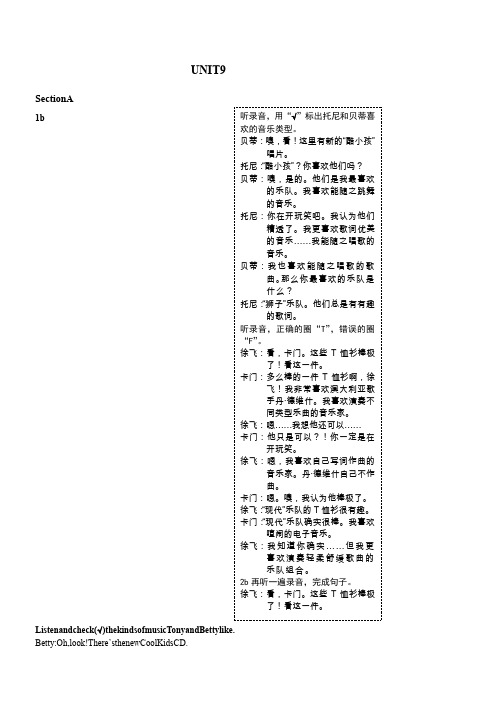
UNIT9SectionA1bListenandcheck(√)thekindsofmusicTonyandBettylike. Betty:Oh,look!There ’sthenewCoolKidsCD.Tony:You2aListenandXuFei:Wic.XuFei:Hmm…Iguesshe’sOK…Carmen:He’sonlyOK?!Youmustbejoking.XuFei:Well,Ilikemusicianswhowritetheirownsongs.DanDer vishdoesn’twritehisownmusic. Carmen:Hmm.Well,Ithinkhe’sgreat.XuFei:TheModern’sT-shirtisinteresting.Carmen:TheModernarereallygreat.Ilove electronicmusicthat’sloud.XuFei:Iknow youdo…butIprefergroups thatplayquietandslowsongs.SectionB1b ListenandwritethethreethingsthatMichaellikesinthefirstcolumnofthechart. Ali:Wow,yousurehavelotsofcoolthings.Whatagreatjacket!Michael:Yeah,it’snew.Ireallylikeit.Ilikeclothesthatareunusual.Ali:Me,too.Say…isthatanewbookoverthere?Michael:Yes,itis.It’sabookaboutvolleyball.Ittellsyouhowyoucanbeagoodplayer. Ali:Isitgood?Michael:Yeah,it’sgreat.Ilikewriterswho explainthingswell.Ali:Me,too.Umm,Michael?Michael:Yes?Ali:Wheredidyougetthatmovieposter?Michael:Yeah,it’sgreat.Ilikewriterswho explainthingswell.Ali:Me,too.Umm,Michael?Michael:Yes?Ali:Wheredidyougetthatmovieposter?Michael:Oh,mybrothergotitforme.Heworksatamovietheater.Ali:Wow,you’resolucky.It’sagreatposter!Michael:Yes,itis.Ilovemoviesthatarescary.Whataboutyou?Ali:Isuredo.Say…Michael…Doyouthinkyourbrothercouldgetthesameposterforme,too? Michael:Probably.I’llaskhim.Ali:Great,thanks!UNIT10SectionA1b Listenandcheckyouranswersin1a.Yoshi:Whatarepeoplesupposedtodowhentheymeetinyourcountry,Rodrigo?Rodrigo:Doyoumeanwhenpeoplemeetforthefirsttime?Yoshi:Yeah.Rodrigo:InMexico,weshakehands.Yoshi:WhataboutinBrazil,Celia?Celia:Well,inBrazil,peoplesometimeskiss.HowaboutinJapan,Yoshi?Whatarepeopleexpectedtodowhentheymeetforthefirsttime? Yoshi:Webow.Mike:Well,IguessinmostWesterncountriesweshakehands.2a stnightshehaddinneratanAmericanfriend’shouse.Listenandcheck(√)themistakesMariamade.Daisy:Hi,Maria.HowwasPaul ’sparty? Maria:Oh,Daisy,itwasterrible. Daisy:Itwas? Maria:Uh-huh.Daisy:Whathappened?Daisy:2b Daisy:Daisy:What ’swrongwiththat?Maria:Well,itturnedoutthatitwasanoutdoorparty,Daisy.EveryoneelsewasinaT-shirtandjeans. Daisy:Iguessnexttimeyoushouldaskwhatyou ’resupposedtowear.玛丽亚:然后当我遇到保罗的妈妈时,我亲吻了她。
新目标九年级上英语听力专项训练一(含听力音频mp3,听力材料及听力试题PPT)
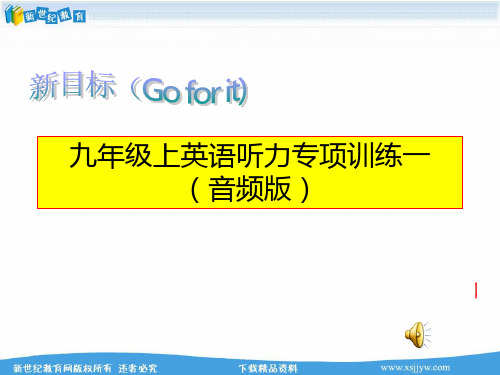
W: Hello, Bill! This is Mary speaking. It’s Sunday tomorrow. What are you going to do? M: I’ve no idea. What about you? W: I know there is a kite show in the park. Shall we go there? M: Good idea. When and where shall we meet? W: Let’s meet at the bus stop at half past eight in the morning. M: OK. See you!
W: Mr. Read, something is wrong! Jack has got a problem. M: What’s the matter? W: He felt off the tree and his leg got hurt. M: Can he walk now? W: No, he is still lying on the ground and he felt terrible. M: He should be sent to the hospital at once. I’ll look after him. And would you please make a phone call to his parents? W: Sure! But I don’t know the number. M: Let me see. It’s 83894551. W: OK. I’ll make it.
九年级英语全册Unit7Teenagersshouldbeallowedtochoosetheirownclothes课文及详解素材新版人教新目标版
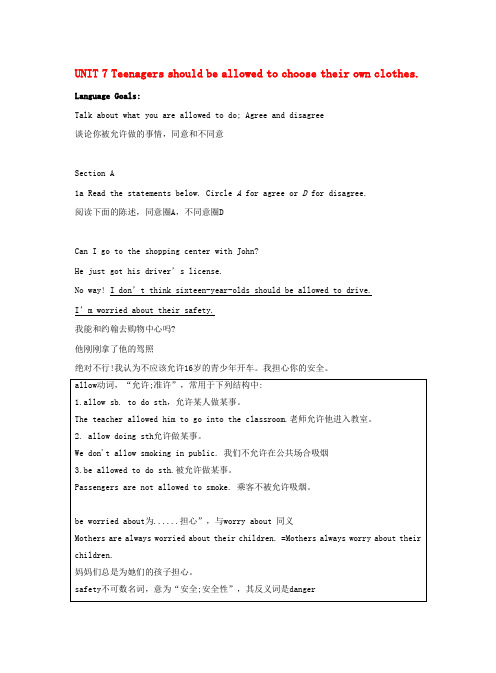
UNIT 7 Teenagers should be allowed to choose their own clothes. Language Goals:Talk about what you are allowed to do; Agree and disagree谈论你被允许做的事情,同意和不同意Section A1a Read the statements below. Circle A for agree or D for disagree.阅读下面的陈述,同意圈A,不同意圈DCan I go to the shopping center with John?He just got his driver’s license.No way! I don’t think sixteen-year-olds should be allowed to drive.I’m worried about their safety.我能和约翰去购物中心吗?他刚刚拿了他的驾照绝对不行!我认为不应该允许16岁的青少年开车。
我担心你的安全。
1. Teenagers should not be allowed to smoke. A D2. Sixteen-year-olds should be allowed to drive. A D3. Students must not be allowed to have part-time jobs. A D4. Sixteen-year-olds should be allowed to get their ears pierced. A D5. Teenagers should be allowed to choose their own clothes. A D不应该允许青少年抽烟。
应该允许16岁的青少年开车。
不应该允许学生做兼职工作。
应该允许16岁的青少年扎耳洞。
九年级英语全一册单词表跟读

我把单词表分成了26个字母,每个字母下面对应着若干单词。
请依次跟读每个单词,注意发音、语调和语速。
祝你学习顺利!A。
ability。
able。
about。
above。
absorb。
accept。
access。
accident。
according。
account。
accurate。
achieve。
achievement。
acknowledge。
acquire。
act。
active。
actor。
actual。
add。
addition。
address。
adequate。
adjust。
administration。
admiration。
admire。
admit。
advance。
advanced。
advantage。
advertise。
advertisement。
advice。
affair。
affect。
afford。
afraid。
after。
afternoon。
again。
against。
age。
agency。
agent。
agreement。
ahead。
air。
airline。
airplane。
airport。
alarm。
alive。
all。
allow。
almost。
alone。
along。
aloud。
already。
also。
alter。
although。
altogether。
always。
amaze。
ambition。
ambulance。
amount。
amuse。
analysis。
ancestor。
anchor。
B。
baby。
back。
background。
bad。
bag。
balance。
ball。
balloon。
ban。
band。
bank。
bar。
barber。
bare。
bargain。
basic。
basket。
bat。
bath。
bathe。
battery。
battle。
be。
beach。
beak。
beam。
bean。
bear。
beat。
beautiful。
beauty。
because。
bed。
beef。
人教新目标九年级英语全一册课文翻译

人教新目标九年级英语全一册课文翻译Unit 1SECTION A1a 我通过制作抽认卡来学习。
通过和朋友一起学习。
通过听磁带。
通过做抽认卡。
通过向老师求助。
通过读课本。
通过制作单词本。
1c A:你怎么为考试而学习。
B:我通过参加学习小组来学习。
2a 1、你是通过看英文录像学英语的吗?2、你曾和朋友们练习过对话吗?3、听磁带怎么样?4、大声朗读以练习发音怎么样?5、我曾经通过参加学习小组的方式学习过吗?2b A是的,我通过那种学习方式学到了很多。
B、哦,是的,它提高了我说英语的能力。
C、有时那样做。
我觉得他有用。
D、不。
(通过看英语录像学习)太难了,无法理解录像中的人所说的话。
2c A你曾经通过参加学习小组来学习吗?B、是的,我参加过,通过那种方式我学到了很多。
Grammer Focus 你怎么为准备一场考试而学习?我靠听磁带。
你怎样学习英语?我通过参加学习小组来学习。
你通过大声朗读来学习英语吗?是的,我是。
你曾和朋友们练习过对话吗?哦,是的,他提高了我说英语的能力。
你曾经通过参加学习小组来学习吗?是的,我参加过。
通过那种方式我学习到了很多。
3a如何才能学得最好这星期我们询问了新星高中的同学关于学习更多英语的最佳方法的问题。
许多同学说他们通过使用英语为学习它,一些还有很特别的建议。
比如,李莉莲说学习新单词的最好的方法是阅读英语杂志。
她说记忆浒音乐的歌词也有一些作用。
当我们问及学习语法的问题时,她说:“我从不学习语法。
它太枯燥了。
”魏明有不同的看法。
他学习英语已经6年了,并且确实喜欢英语。
他认为学习语法是学习一门语言的一种好方法。
他还认为观看英语电影也不错,国灰他可以看到演员说话的情形。
但是,有时候他发现看英语电影是件很头痛的事情,因为那些演员说话太快了。
刘畅说加入学校英语俱乐部是提高英语最好的方法。
学生有很多练习的机会并且他们也有很多乐趣。
她补充说和朋友练习会话一点用处也没有。
“我们会因为某件事变得很激动,最后用汉语来讲,”她说。
人教版新目标九年级英语全册单词表(按词性)

单词释义ability能力;才能address地址;通讯处advantage优点;有利条件agreement一致;同意airport机场alien外星人ancestor祖宗;祖先ant蚂蚁Asian亚洲人attention注意;关注Australian澳大利亚人background背景backpack背包;旅行包balloon气球banker银行家basket篮;筐bathroom浴室;洗手间bean豆;豆荚bell钟(声);铃(声)bin垃圾箱biscuit饼干blackboard黑板block街区blouse(女士)短上衣;衬衫bookstore书店boss老板;上司bottle瓶;瓶子bottom底部;最下部bow鞠躬brain大脑brand品牌;牌子burial埋葬;安葬burn着火;燃烧business生意;商业Canadian加拿大人cap(尤指有帽舌的)帽capital首都;国都case情况;实情celebration庆典;庆祝活动ceremony典礼;仪式chain链子;链条chalk粉笔chance机会;可能性chemistry化学choice选择;挑选chopstick筷子Christmas圣诞节circle圆圈clay黏土;陶土clerk职员coach教练;私人教师coal煤;煤块coast海岸;海滨coat外套;外衣coin硬币community社区;社团competitor参赛者;竞争者conversation交谈;谈话cookie曲奇饼干corner拐角;角落cost花费;价钱costume服装;装束cotton棉;棉花courage勇敢;勇气course课程;学科cream奶油;乳脂creativity创造力;独创性crowd人群;观众cry哭;叫喊custom风俗;习俗customer顾客;客户degree(大学)学位;度数;程度dessert(饭后)甜点;甜食dialogue(=dialog)对话;对白direction方向;方位director导演;部门负责人disbelief不信;怀疑discovery发现;发觉documentary纪录片doubt疑惑;疑问drama戏;剧earring耳环;耳饰earthquake地震east东方ecosystem生态系统effort努力;尽力elbow肘;胳膊electricity电;电能ending(故事、电影等的)结尾;结局enemy敌人;仇人energy精力;力量European欧洲人eve(尤指宗教节假日的)前夕;前夜examination考试;审查exchange交换expression表达(方式);表示fair展览会;交易会fairy童话故事fame名声;声誉fault过失;缺点field田野;场地fin(鱼)鳍fisherman渔民;钓鱼的人flash闪光灯;闪光fool蠢人;傻瓜fork餐叉,叉子form形式;类型fridge冰箱friendship友谊;友情garden花园;园子gate大门general将军gentleman先生;绅士ghost鬼;鬼魂glass玻璃glove(分手指的)手套goal球门;射门;目标goddess女神graduation毕业grammar语法granddaughter(外)孙女grape葡萄grass草;草地guard警卫;看守guy(非正式)家伙(pl)伙计们handbag小手提包happening事件;发生的事情(常指不寻常的)heat热;高温heel鞋跟;足跟hero英雄;男主角historian历史学家;史学工作者hoax骗局;恶作剧honor(=honour)荣幸hug拥抱;搂抱industry工业;行业influence影响insect昆虫inspiration灵感;鼓舞人心的人(或事物)instruction指示;命令instrument器械;仪器;工具interview访谈introduction介绍iron铁Italian意大利人;意大利语keyboard键盘式电子乐器;键盘king君主;国王kiss亲吻;接吻knock敲击声;敲击knowledge知识;学问laboratory实验室lady女士;女子lantern灯笼law法律;法规leader领导;领袖leaf叶;叶子lemon柠檬level标准;水平license (= licence)证;证件lifetime一生;有生之年list名单;清单litter垃圾;废弃物lock锁lyrics歌词mail邮件mall商场;购物中心manager经理;经营者manner方式;礼貌market市场;集市master大师;能手;主人material材料;原料metal金属method方法;措施midsummer仲夏;中夏minister大臣;部长mystery奥秘;神秘事物napkin餐巾;餐巾纸noise声音;噪音noon正午;中午note笔记;记录novel(长篇)小说officer军官;官员pain痛苦;疼痛;苦恼pal朋友;伙伴palace王宫;宫殿partner搭档;同伴passport护照patient病人pattern模式;方式period一段时间;时期physics物理;物理学picnic野餐pie果馅饼;果馅派pink粉红色pioneer先锋;先驱pity遗憾;怜悯plastic塑料;塑胶pleasure高兴;愉快poem诗;韵文policeman男警察popularity受欢迎;普及position位置;地方postcard明信片postman邮递员pound磅(重量单位);英镑power权利;力量praise表扬;赞扬present现在;礼物president负责人;主席;总统pride自豪;骄傲process过程product产品;制品project项目;工程pronunciation发音;读音public民众purpose目的;目标queen王后;女王rabbit兔;野兔regret感到遗憾;懊悔relative亲属;亲戚relief轻松;解脱request要求;请求restroom(美)洗手间;公共厕所review回顾;复习row一排;一列;一行ruler统治者;支配者rush仓促;急促sadness悲伤;悲痛safety安全;安全性saint圣人;圣徒scissors剪刀scoop勺; 铲子score得分;打分Scrooge(非正式)吝啬鬼season季;季节secret秘密sense感觉;意识sentence句子shark鲨鱼shoulder肩;肩膀shyness害羞;腼腆sliver银;银器smell气味smoke烟society社会somebody重要人物spaghetti意大利面条speaker讲(某种语言)的人;发言者speech讲话;发言speed速度spider蜘蛛spread蔓延;传播staff管理人员;职工stamp邮票;印章standard标准;水平steel钢;钢铁stranger陌生人style样式; 款式suggestion建议suit西服;套装superhero超级英雄support支持surface表面;表层survey调查takeaway外卖食物task任务;工作teammate同队队员;队友teen(13-19岁之间的)青少年temple庙宇;寺院;圣殿text课文;文本textbook教科书;课本tie领带ton吨total总数;合计trade贸易;交易tradition传统traffic交通;路上行驶的车辆transportation运输业;交通运输treat款待;招待;请客trick花招;把戏truck卡车;货车underground地铁value价值victory胜利;成功war战争;战争状态warmth温暖;暖和warn警告;告诫washroom洗手间;厕所wealth财富;富裕website网站weight重量;分量west西;西方wing翅膀;翼wolf狼work(音乐、艺术)作品workday工作日worker工作者;工人wound伤;伤口;创伤zipper(= zip)拉链;拉锁。
英语九年级全一册录音,九年级英语书录音
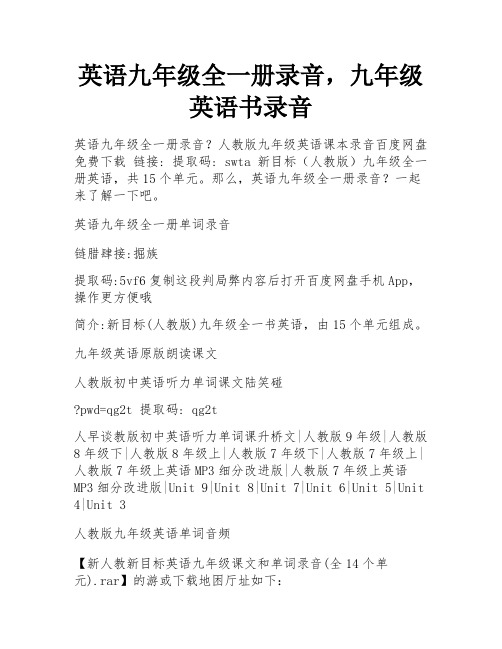
英语九年级全一册录音,九年级英语书录音英语九年级全一册录音?人教版九年级英语课本录音百度网盘免费下载链接: 提取码: swta 新目标(人教版)九年级全一册英语,共15个单元。
那么,英语九年级全一册录音?一起来了解一下吧。
英语九年级全一册单词录音链腊肆接:掘族提取码:5vf6复制这段判局弊内容后打开百度网盘手机App,操作更方便哦简介:新目标(人教版)九年级全一书英语,由15个单元组成。
九年级英语原版朗读课文人教版初中英语听力单词课文陆笑碰pwd=qg2t 提取码: qg2t人早谈教版初中英语听力单词课升桥文|人教版9年级|人教版8年级下|人教版8年级上|人教版7年级下|人教版7年级上|人教版7年级上英语MP3细分改进版|人教版7年级上英语MP3细分改进版|Unit 9|Unit 8|Unit 7|Unit 6|Unit 5|Unit 4|Unit 3人教版九年级英语单词音频【新人教新目标英语九年级课文和单词录音(全14个单元).rar】的游或下载地困厅址如下:链接:密码:wage注:这是压缩文件,需汪磨隐解压成mp3格式才能播放。
九年级人教版英语听力《九年级英语》百度网盘资源免费下载链接:pwd=esu8 提取码: esu8升级版人教版初中英语九年级全一册|赠品----黄冈名师中高考专题讲座|赠品----国家特教教师视频|英语初中拦游3年级Unit9_Section_B_54F8.rmvb|英语初中3年级Unit9_Section_A_7A90.rmvb|英语初中3年级Unit8_Section_B_3C47.rmvb|英语初中3年级Unit8_Section_A_9026.rmvb|英语初中3年级Unit7_Section_B_0BA5.rmvb|英语初中3年级Unit7_Section_A_C402.rmvb|英语初中3年级Unit6_Section_B_6B80.rmvb|英语初中3年级Unit6_Section_A_D29C.rmvb|英语初中3年级Unit5_Section_B_B4FC.rmvb|英语初中3年级Unit5_Section_A_F871.rmvb|英语初中3年级Unit4_Section_B_4401.rmvb|英语初中胡好3年级Unit4_Section_A_AB64.rmvb简做销九年级英语单词表录音2014年人教版九年级英语全册英语MP3(单词高毕+课文+听力)"百度网盘下载链接:说明:1.这是一个大容量的压缩文件。
人教新目标版九年级英语全册词汇表(含音标及课本原文例句)
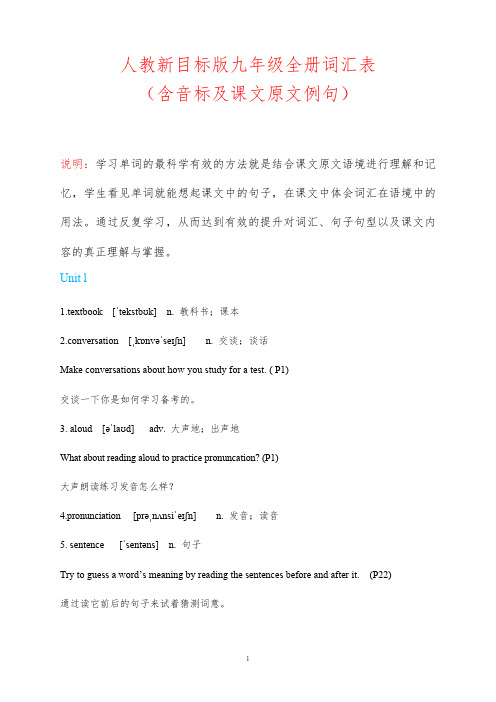
人教新目标版九年级全册词汇表(含音标及课文原文例句)说明:学习单词的最科学有效的方法就是结合课文原文语境进行理解和记忆,学生看见单词就能想起课文中的句子,在课文中体会词汇在语境中的用法。
通过反复学习,从而达到有效的提升对词汇、句子句型以及课文内容的真正理解与掌握。
Unit l1.textbook [ˈtekstbʊk] n. 教科书;课本2.conversation [ˌkɒnvəˈseɪʃn] n. 交谈;谈话Make conversations about how you study for a test. ( P1)交谈一下你是如何学习备考的。
3. aloud [əˈlaʊd] adv. 大声地;出声地What about reading aloud to practice pronuncation? (P1)大声朗读练习发音怎么样?4.pronunciation [prəˌnʌnsiˈeɪʃn] n. 发音;读音5. sentence [ˈsentəns] n. 句子Try to guess a word’s meaning by reading the sentences before and after it. (P22)通过读它前后的句子来试着猜测词意。
6. patient [ˈpeɪʃnt] adj. 有耐心的Well, bepatient. (P2) 要有耐心。
7. expression [ɪkˈspreʃn] n. 表达(方式);表示Although I could not understand everything the characters said, their body language and the expressions on their faces helped me to get the meaning. ( P3)虽然我无法理解电影角色所说的每一句话,但他们的肢体语言以及脸上的表情帮我了解了台词的含义。
人教版九年级全册英语课文单词语音+电子书+视频 Unit 10

人教版九年级全册英语课文单词语音+电子书+视频 Unit 10Unit10 You are supposed to shake hands.Unit10重点单词custom [ˈkʌstəm] n. 风俗;习俗bow [bəʊ] v.& n. 鞠躬kiss [kɪs] v.& n. 亲吻;接吻greet [griːt] v. 和……打招呼;迎接relaxed [rɪ lækst] adj. 放松的;自在的value [ˈvæljuː] v. 重视;珍视n.价值capital [ kæpɪtl] n. 首都;国都noon [nuːn] n. 正午;中午mad [mæd] adj. 很生气;疯的effort [ efət] n. 努力;尽力passport [ˈpɑːspɔːt] n. 护照chalk [tʃɔːk] n. 粉笔blackboard [ blækbɔːd] n. 黑板northern [ nɔːðən] adj. 北方的;北部的coast [kəʊst] n. 海岸;海滨season [ siːzn] n. 季;季节knock [nɒk] v. 敲;击eastern [ˈiːst(ə)n] adj. 东方的;东部的worth [wɜːθ] adj. 值得;有……价值(的)manner [ˈmænə] n. 方式;方法 (pl.)礼貌;礼仪empty [ empti] adj. 空的;空洞的basic [ beɪsɪk] adj. 基本的;基础的exchange [ɪksˈtʃeɪndʒ] n.& v. 交换granddaughter [ˈɡrændɔːtə] n.(外)孙女behave [bɪˈheɪv] v. 表现;举止except [ɪk sept] prep. 除……之外 conj. 除了;只是elbow [ elbəʊ] n. 肘;胳膊gradually [ˈɡrædjʊəli] adv. 逐步地;渐进地suggestion [səˈdʒestʃ(ə)n] n. 建议Unit10重点短语1. be supposed to do sth. 应该做某事2. be expected to do sth. 被期望做某事3. shake hands (with…) (和……) 握手4. bow to sb. 向某人鞠躬5. for the first time 首次,第一次6. greet sb.( in) the wrong way 以错误的方式问候某人7. be invited to ... 被邀请去…...8. be invited to do sth. 被邀请做某事9.wele party 欢迎会10. as soon as 一……就……(引导时间状语从句)11. as soon as sb. can 某人尽可能快地12.hold out (my hands) 伸出(我的手)13. on both sides of my face在我的双颊上14. be from= e from 来自15. be relaxed about 对……放松16. a bit/ little late 有点晚17. value the time we spend with sb. 珍惜我们与某人度过的时间18.in our everyday lives 在我们的日常生活中19. drop by 顺便拜访,随便进入20. make plans ( to do sth.) 计划(做某事)21. plan to do sth.计划做某事22. on the side of the face在脸的一边23. the town center 城镇中心24. as many as sb. can = as many as possible 尽可能多的25. be on time 守时26. the capital of clocks and watches钟表之都27. after all 毕竟;终归28. at noon 在中午29. 15 minutes late 迟到15分钟30. get mad 大动肝火;气愤31. make an effort 作出努力32. go out of one’s way 特地;格外努力33. make ... feel at home 使(某人)感到宾至如归Unit10重点句子1. He should have told me about it.他本应该把这件事告诉我。
人教版新目标九年级全一册英语课文翻译

人教版新目标九年级全一册英语课文翻译一单元SECTION A1a 我通过制作抽认卡来学习。
通过和朋友一起学习。
通过听磁带。
通过做抽认卡。
通过向老师求助。
通过读课本。
通过制作单词本。
1c A:你怎么为考试而学习。
B:我通过参加学习小组来学习。
2a 1、你是通过看英文录像学英语的吗? 2、你曾和朋友们练习过对话吗? 3、听磁带怎么样? 4、大声朗读以练习发音怎么样?5、我曾经通过参加学习小组的方式学习过吗?2b A是的,我通过那种学习方式学到了很多。
B、哦,是的,它提高了我说英语的能力。
C、有时那样做。
我觉得他有用。
D、不。
(通过看英语录像学习)太难了,无法理解录像中的人所说的话。
2c A你曾经通过参加学习小组来学习吗?B、是的,我参加赤字,通过那种方式我学到了很多。
Grammer Focus 你怎么为准备一场考试而学习?我靠听磁带。
你怎样学习英语?我通过参加学习小组来学习。
你通过大声朗读来学习英语吗?是的,我是。
你曾和朋友们练习过对话吗?哦,是的,他提高了我说英语的能力。
你曾经通过参加学习?小组来学习吗?是的,我参加过。
通过那种方式我学习到了很多。
3a如何才能学得最好这星期我们询问了新星高中的同学关于学习更多英语的最佳方法的问题。
许多同学说他们通过使用英语为学习它,一些还有很特别的建议。
比如,李莉莲说学习新单词的最好的方法是阅读英语杂志。
她说记忆浒音乐的歌词也有一些作用。
当我们问及学习语法的问题时,她说:“我从不学习语法。
它太枯燥了。
”魏明有不同的看法。
他学习英语已经6年了,并且确实喜欢英语。
他认为学习语法是学习一门语言的一种好方法。
他还认为观看英语电影也不错,国灰他可以看到演员说话的情形。
但是,有时候他发现看英语电影是件很头痛的事情,因为那些演员说话太快了。
刘畅说加入学校英语俱乐部是提高英语最好的方法。
学生有很多练习的机会并且他们也有很多乐趣。
她补充说和朋友练习会话一点用处也没有。
“我们会因为某件事变得很激动,最后用汉语来讲,”她说。
人教版新目标九年级英语单词默写表(全册)[1]
![人教版新目标九年级英语单词默写表(全册)[1]](https://img.taocdn.com/s3/m/766a530c0975f46526d3e1e5.png)
人教版新目标九年级英语单词默写表(全册)(word版可编辑修改)编辑整理:尊敬的读者朋友们:这里是精品文档编辑中心,本文档内容是由我和我的同事精心编辑整理后发布的,发布之前我们对文中内容进行仔细校对,但是难免会有疏漏的地方,但是任然希望(人教版新目标九年级英语单词默写表(全册)(word版可编辑修改))的内容能够给您的工作和学习带来便利。
同时也真诚的希望收到您的建议和反馈,这将是我们进步的源泉,前进的动力。
本文可编辑可修改,如果觉得对您有帮助请收藏以便随时查阅,最后祝您生活愉快业绩进步,以下为人教版新目标九年级英语单词默写表(全册)(word版可编辑修改)的全部内容。
九年级单词默写Unit ln。
教科书;课本n。
交谈;谈话adv。
大声地;出声地n. 发音;读音n。
句子adj。
有耐心的/ n. 病人n.表情;表示;表达方式v. 发现;发觉n。
秘密;秘诀/ adj。
秘密的;保密的(在词典,参考书中或通过电脑)查阅;抬头看n。
语法v. 重复;重做n. 笔记;记录 / v。
注意;指出n. 朋友;伙伴n。
物理;物理学n。
化学v.记忆;记住n。
模式;方式v。
发音v。
增加;增长n. 速度n。
搭档;同伴v。
出生 / adj.天生的天生具有n。
能力;才能v。
创造;创建n. 大脑adj. 活跃的;积极的n。
注意;关注注意;关注v.(使)连接;与⋯⋯有联系把⋯⋯和⋯⋯连接或联系起来adv. 一夜之间;在夜间v。
/ n。
回顾;复习n. 知识;学问adj。
终身的;毕生的adv。
明智地;聪明地九年级单词默写Unit 2n.月饼n。
灯笼n。
陌生人n. 亲属;亲戚增加(体重);发胖n. 磅(重量单位);英镑(英国货币单位)adj. 民间的;民俗的n。
女神pron。
无论谁;不管什么人v. 偷;窃取v。
放置;安放;产(卵);下(蛋)( / )摆开;布置n(饭后)甜点;甜食n。
花园;园子n.传统v。
欣赏;仰慕n。
领带/ v。
捆;束adj。
新版新目标九年级英语单元长课文翻译
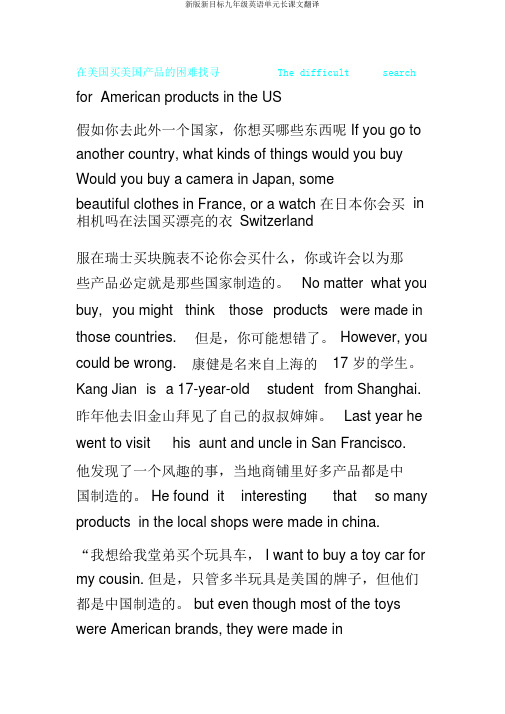
在美国买美国产品的困难找寻The difficult search for American products in the US假如你去此外一个国家,你想买哪些东西呢 If you go to another country, what kinds of things would you buy Would you buy a camera in Japan, somein beautiful clothes in France, or a watch 在日本你会买相机吗在法国买漂亮的衣Switzerland服在瑞士买块腕表不论你会买什么,你或许会以为那些产品必定就是那些国家制造的。
No matter what you buy, you might think those products were made in those countries. 但是,你可能想错了。
However, you could be wrong. 康健是名来自上海的17 岁的学生。
Kang Jian is a 17-year-old student from Shanghai. 昨年他去旧金山拜见了自己的叔叔婶婶。
Last year he went to visit his aunt and uncle in San Francisco.他发现了一个风趣的事,当地商铺里好多产品都是中国制造的。
He found it interesting that so many products in the local shops were made in china.“我想给我堂弟买个玩具车, I want to buy a toy car for my cousin. 但是,只管多半玩具是美国的牌子,但他们都是中国制造的。
but even though most of the toys were American brands, they were made inchina. ”不但玩具是中国制造的。
2016人教版九年级全册英语单词词汇表
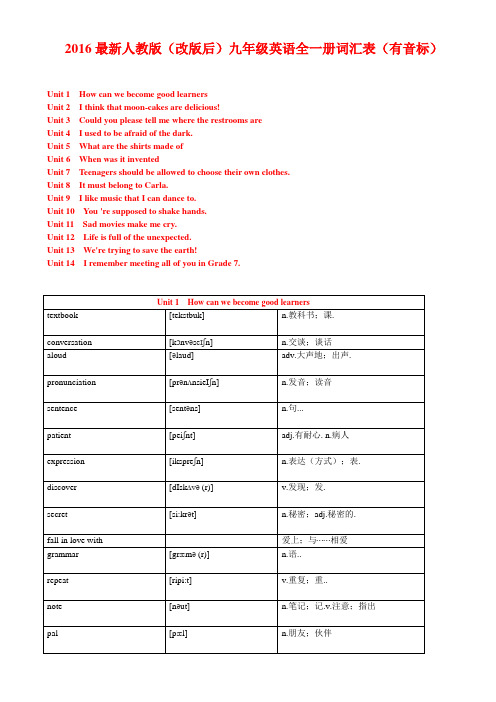
[fæsineitiŋ]
a.迷人的;有吸引力的
convenient
[kənvi:niənt]
a.便利的;方便的
mall
[mɔ:l]
n.商场;购物中...
clerk
[kla:k;kl:rk]
n.职.
corner
[kɔ:(r)nə(r)]
n.拐角;角.
polite
[pəlait]
adj.有礼貌的;客气的
Unit 4 I used to be afraid of the dark.
Unit 5 What are the shirts made of
Unit 6 When was it invented
Unit 7 Teenagers should be allowed to choose their own clothes.
v.敢于;胆.
private
[praivət]
adj.私人的;私密的
guard
[ga:(r)d]
n.警卫;看守v.守卫;保卫
require
[rikwaiə(r)]
v.需要;要..
European
[ju(ə)rəpi:ən]
a.欧洲\人的
British
[britiʃ]
adj.英国的;英国人的
speech
[praid]
n.自豪;骄......
take pride in
为⋯⋯感到自豪
grandson
[grænsʌn]
n.孙子;外.
general
[dʒenrəl]
a.普遍的;常规的;总.n.将军
introduction
[intrədʌkʃn]
- 1、下载文档前请自行甄别文档内容的完整性,平台不提供额外的编辑、内容补充、找答案等附加服务。
- 2、"仅部分预览"的文档,不可在线预览部分如存在完整性等问题,可反馈申请退款(可完整预览的文档不适用该条件!)。
- 3、如文档侵犯您的权益,请联系客服反馈,我们会尽快为您处理(人工客服工作时间:9:00-18:30)。
2016新目标英语九年级全册课文和单词录音(MP3)
九年级英语全册听力mp3:21世纪教育网为您提供最新2016九年级英语单词mp3,九年级英语全册课文听力mp3,助你轻松背单词,是同学们学习的最佳资料,欢迎下载!更多初中英语听力mp3训练下载,请关注21世纪教育网初中英语栏目! 2016新目标英语九年级全册课文和单词录音(MP3) Unit 1 How can we become good learners.(课文和单词音频) 下载 Unit 2 I think that mooncakes are delicious! (课文和单词下载 Unit 3 Could you please tell me where the restrooms are? 下载 Unit 4 I used to be afraid of the dark. (课文和单词音频) 下载 Unit 5 What are the shirts made of?(课文和单词音频) 下载 Unit 6 When was it invented? (课文和单词音频) 下载 Unit 7 Teenagers should be allowed to choose their own 下载 Unit 8 It must belong to Carla.(课文和单词音频) 下载 Unit 9 I like music that I can dance to. (课文和单词音频下载Unit 10 You’re supposed to shake hands.(课文和单词音频) 下载 Unit 11 Sad movies make me cry.(课文和单词音频) 下载Unit 12 Life is full of the unexpected.(课文和单词音频) 下载Unit 13 We’re trying to save the earth!(课文和单词音频) 下载 Unit 14 I remember meeting all of you in Grade 7.(课文和下载新目标英语九年级(全册)单词听力MP3 下载新目标英语九年级(全)课文+单词听力MP3 下载。
